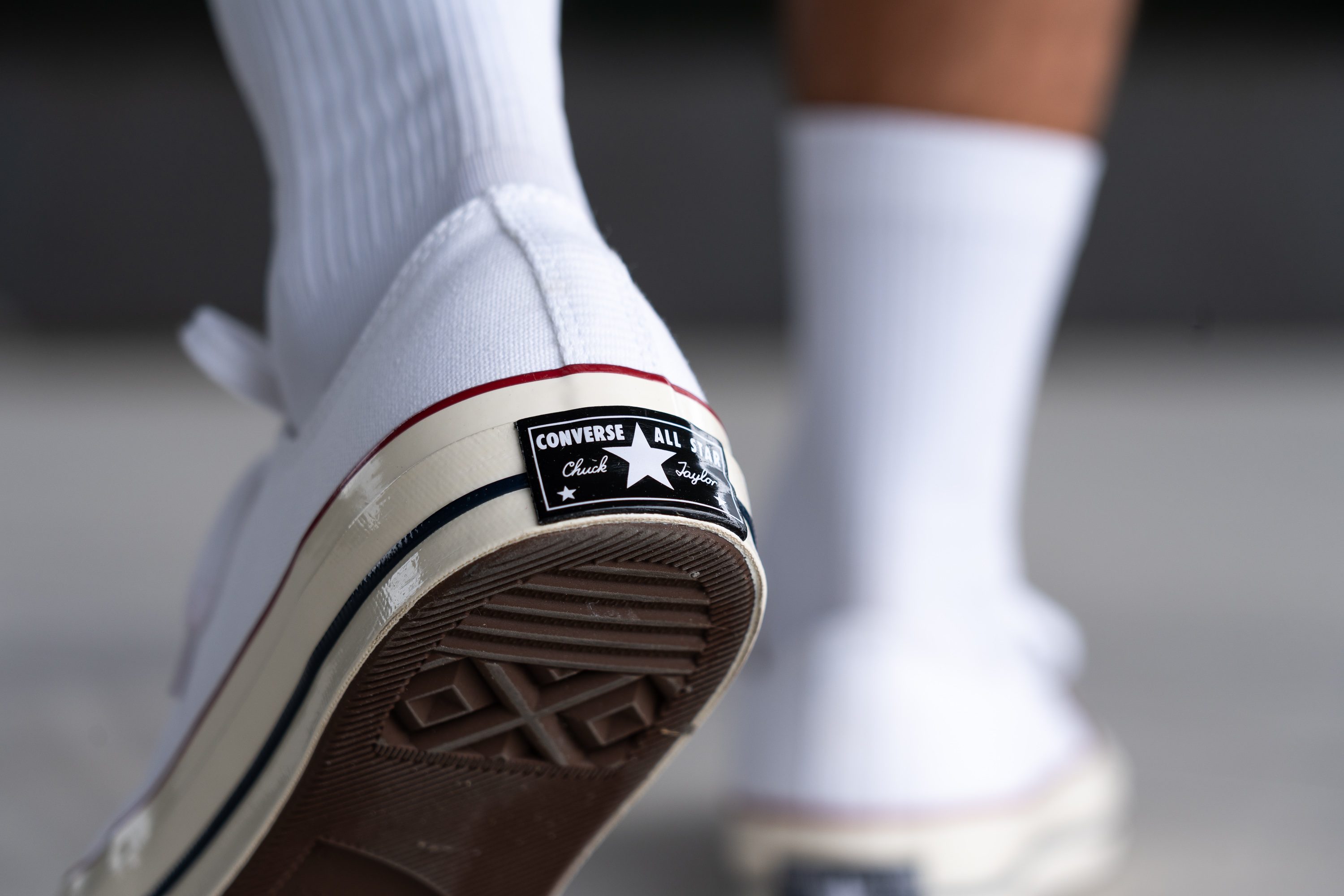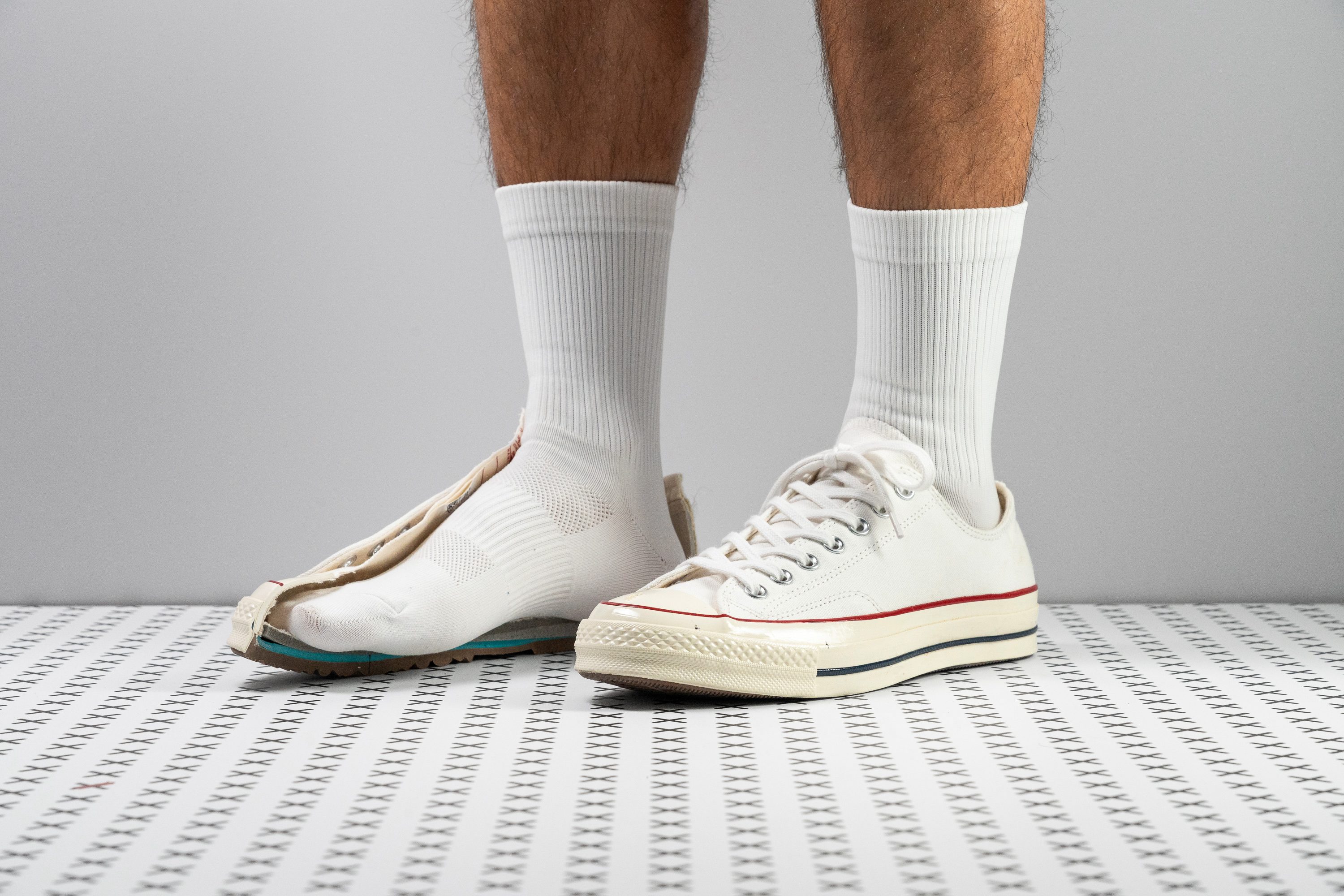Our verdict
- Top pick in best canvas sneakers
Pros
- Eternally stylish and popular silhouette
- Works with any outfit and occasion
- Impressible durability for the price
- A more comfortable Chuck Taylor
- Grounded platform
- Surprisingly flexible
- Affordable price point
- Glossy finish on the sole
Cons
- Not for hot weather
- Lacks support
- Very narrow profile
- A bit heavier than average
Audience verdict
Comparison
The most similar sneakers compared
+ + Add a shoe | |||||
|---|---|---|---|---|---|
| Audience score | 92 Great! | 91 Great! | 93 Great! | 94 Superb! | |
| Price | $85 | $125 | $115 | $110 | |
| Style | ClassicRetroSportyMinimalist | ClassicRetroSporty | ClassicRetroSporty | RetroSporty | |
| Shock absorption | - | Low | Low | - | |
| Energy return | - | Low | Moderate | - | |
| Traction | - | High | Moderate | - | |
| Breathability | Warm | Warm | Moderate | Moderate | |
| Weight lab | 16 oz / 454g | 14.5 oz / 411g | 14.8 oz / 420g | 16.4 oz / 465g | |
| Size | Slightly large | True to size | True to size | True to size | |
| Midsole softness | Balanced | Balanced | Firm | Balanced | |
| Material | CanvasVulc Sole | Cup SoleLeather | Cup SoleLeather | Leather | |
| Season | SpringFall | SpringFall | SpringFall | SpringFall | |
| Inspired from | Basketball | Basketball | Basketball | Basketball | |
| Width / fit | Medium | Medium | Medium | Medium | |
| Toebox width | Narrow | Medium | Medium | Medium | |
| Leather/suede quality | - | Real leather | Real leather | Real leather | |
| Toebox durability | Decent | Decent | Decent | Good | |
| Heel padding durability | Bad | Decent | Decent | Decent | |
| Outsole durability | Decent | Good | Decent | Decent | |
| Heel stack lab | 24.3 mm | 22.9 mm | 23.1 mm | 27.0 mm | |
| Stiffness | Moderate | Moderate | Moderate | Stiff | |
| Tongue padding | Very thin | Average | Average | Average | |
| Drop lab | 7.6 mm | 11.1 mm | 7.6 mm | 12.5 mm | |
| Forefoot | 16.7 mm | 11.8 mm | 15.5 mm | 14.5 mm | |
| Removable insole | ✓ | ✓ | ✓ | ✓ | |
| Heel tab | None | None | None | None | |
| Torsional rigidity | Flexible | Moderate | Moderate | Moderate | |
| Heel counter stiffness | Flexible | Stiff | Moderate | Stiff | |
| Closure | Laces | Laces | Laces | LacesVelcro | |
| Top | Low top | Low top | Low top | Low top | |
| Ranking | #42 Top 35% | #57 Top 48% | #30 Top 25% | #20 Top 17% | |
| Popularity | #100 Bottom 17% | #37 Top 31% | #21 Top 18% | #63 Bottom 47% |
Who should buy
We believe that the Chuck 70 Low Top belongs in your sneaker stack if you want:
- a versatile low-cut sneaker that can complete any look (sporty, casual, and even business casual)
- an improved version of the original Chuck Taylor All-Star (for an extra $25 you get better quality and comfort)
- an affordable sneaker with excellent value for money (which you can often get at a discounted price)
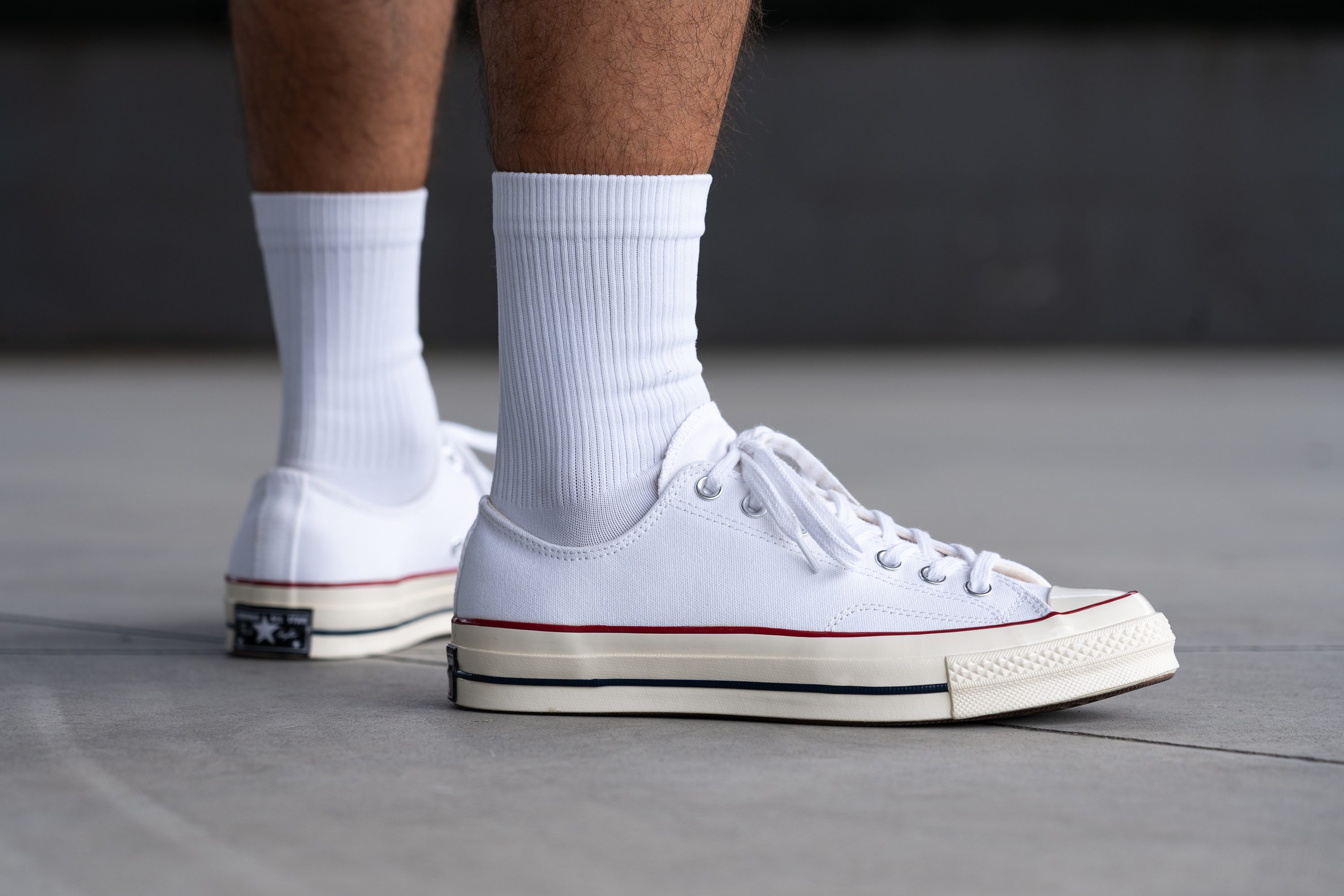
Who should NOT buy
As much as we adore the simplistic beauty of the Chuck 70 Low Top, the shoe just lacks the essential components of a daily beater.
If you want a minimalist sneaker that offers much better comfort for long hours on the feet, try the Allbirds Tree Runners or Wool Runners. They sure lack a fashion statement but take much better care of your feet.
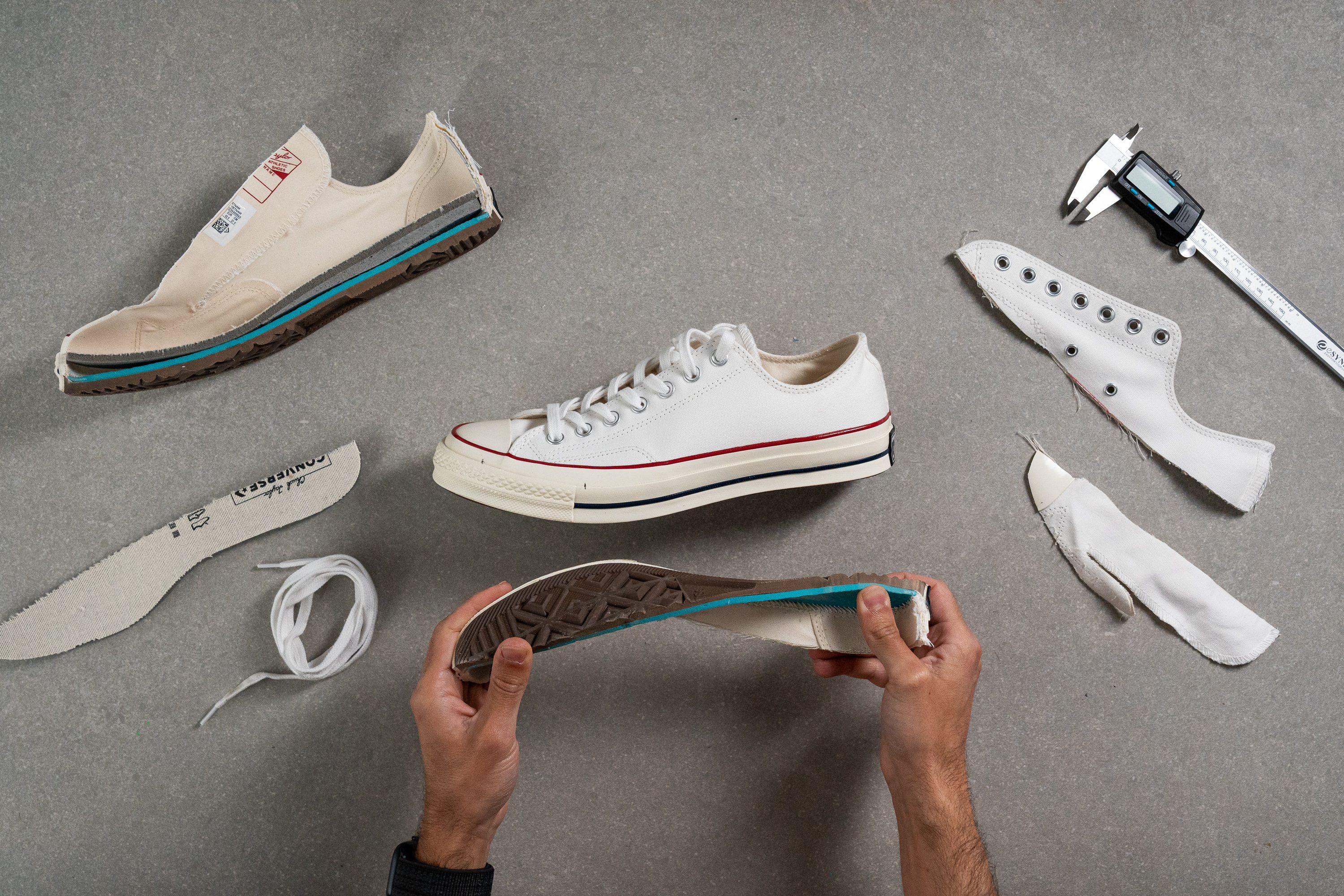
Cushioning
Heel stack
Even though the Chuck 70 cushioning has been enhanced in the Chuck 70, it remains a very grounded sneaker just like the All-Star.
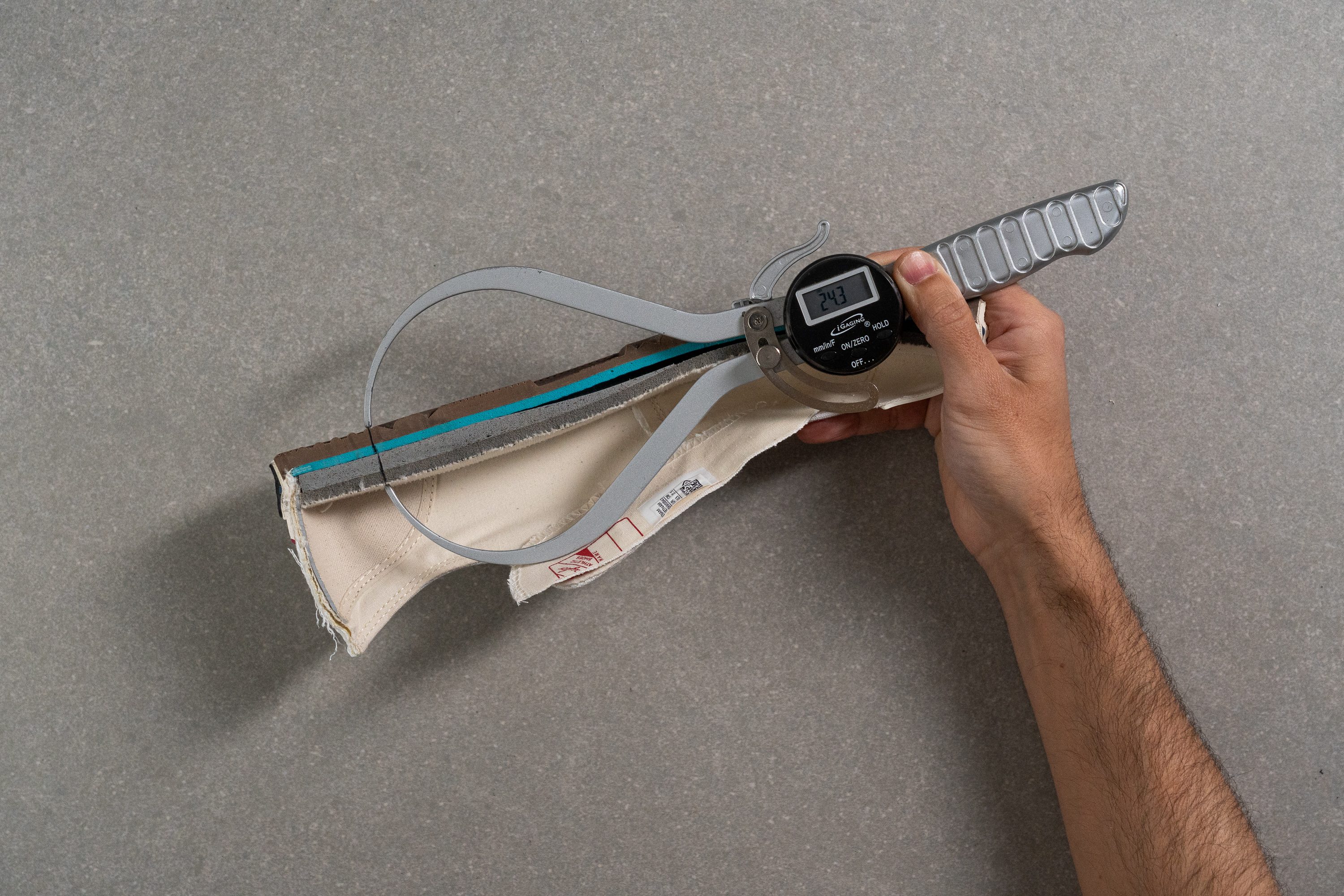
Measuring its heel stack with a caliper, we got only 24.3 mm. This is notably lower than average. Pair that with the shoe's hard rubber and firm midsole, and it won't return you much shock absorption of cushioning underfoot.
| Chuck 70 Low Top | 24.3 mm |
| Average | 30.7 mm |
Forefoot stack
The balls of our feet sat even closer to the ground in the Chuck 70 than the heel. No surprise our caliper showed only 16.7 mm in the shoe's forefoot.
If you have sensitive feet and don't want to feel every stone underfoot, we advise getting a more cushioned sneaker.
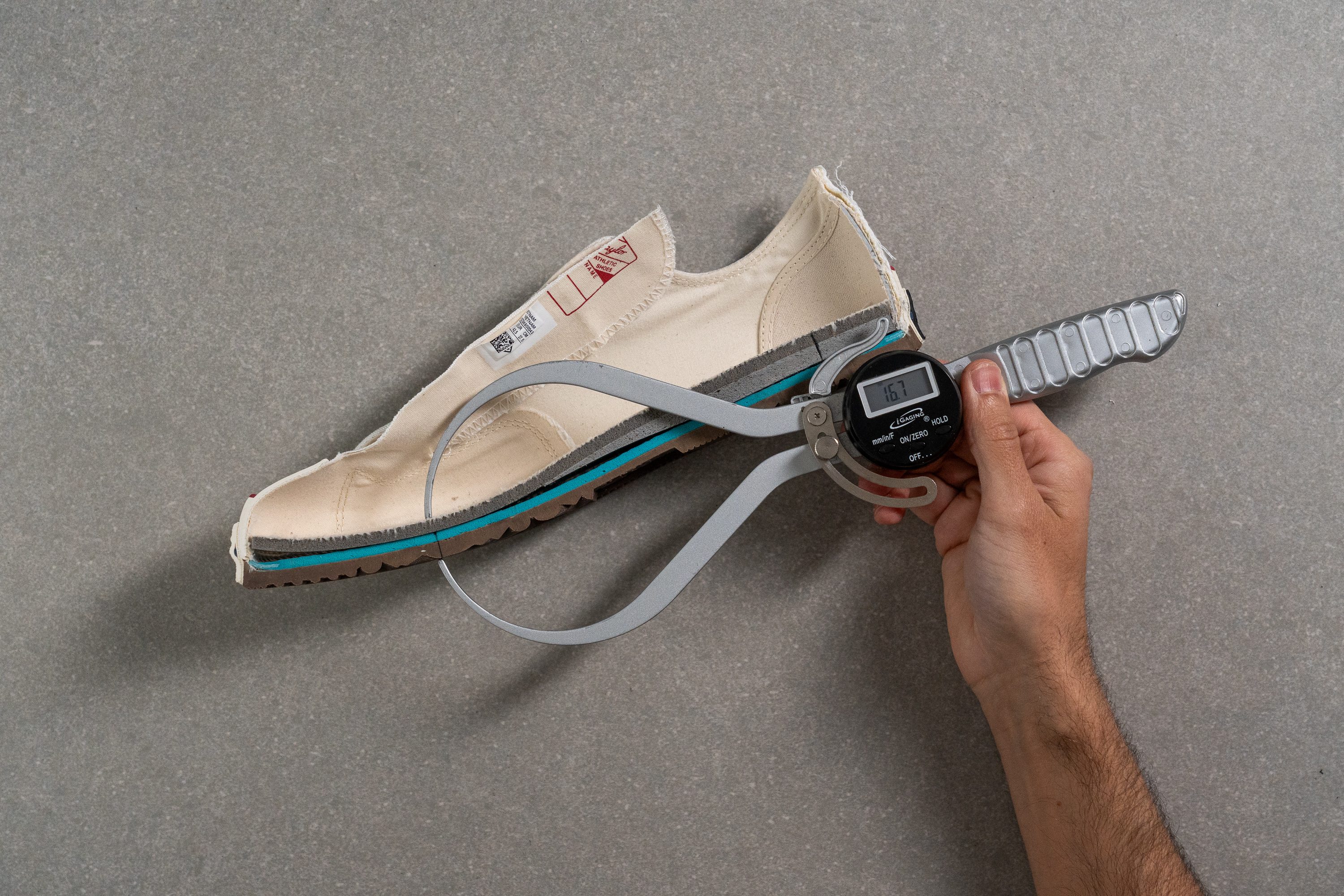
| Chuck 70 Low Top | 16.7 mm |
| Average | 19.5 mm |
Drop
The Chuck 70 has a very gradual heel-to-toe slope. The difference in stack height between the shoe's heel and forefoot is only 7.6 mm, which is barely noticeable underfoot.
This sneaker feels almost flat.
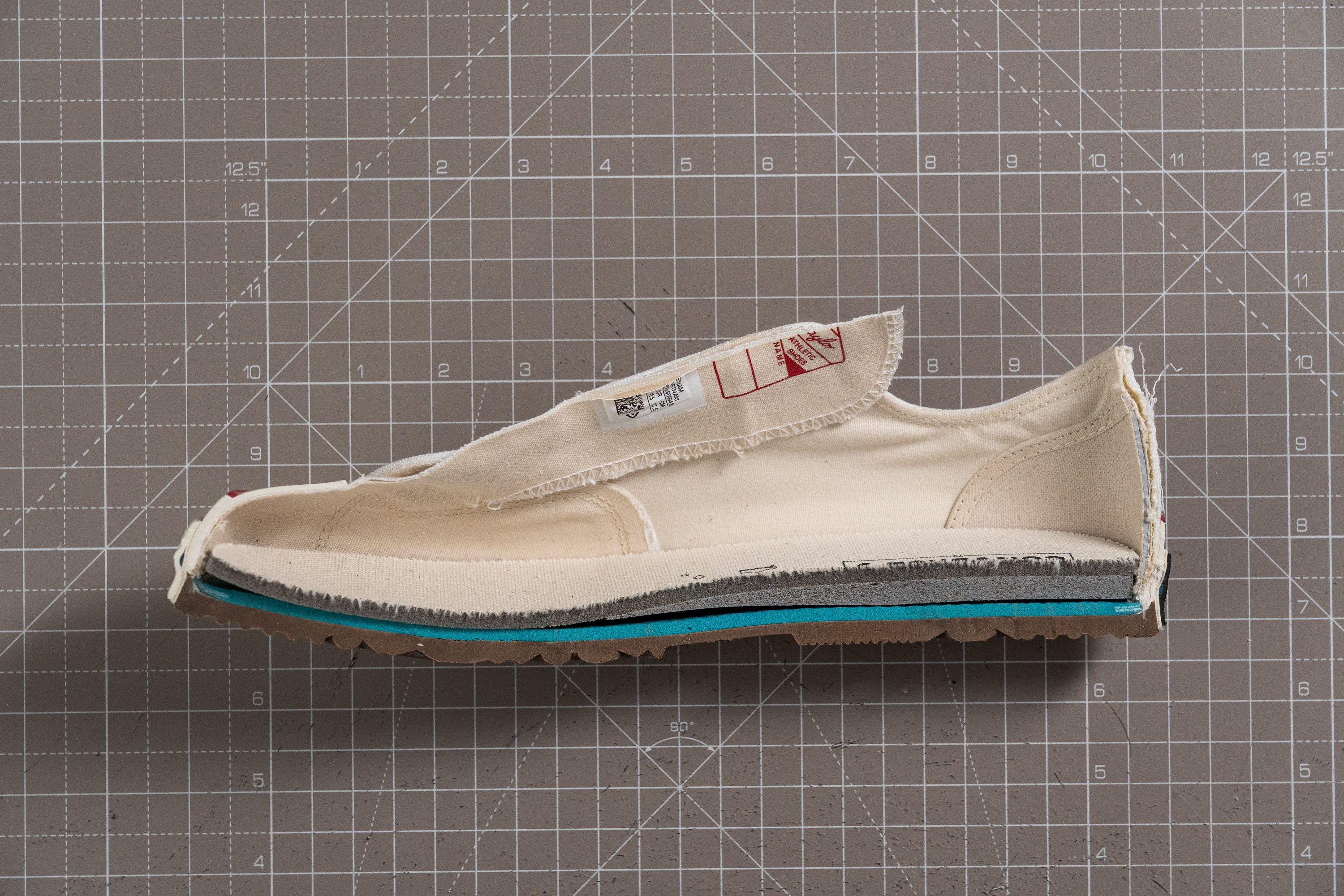
| Chuck 70 Low Top | 7.6 mm |
| Average | 11.2 mm |
Midsole softness
Having so much hard rubber underfoot, the Chuck 70 Low Top is not your soft cushy sneaker. But the good news is that it doesn't feel as hard as the original Chuck Taylor All-Star.
On top of the shoe's firm rubber is a thin layer of blue foam. It helps to buffer the foot from the hard rubber outsole and the pavement beneath it.
The foam feels moderately soft to the touch. Pressing our durometer against it, we got a reading of 24.5 HA. It is 25% softer than average but still not in the plush range.
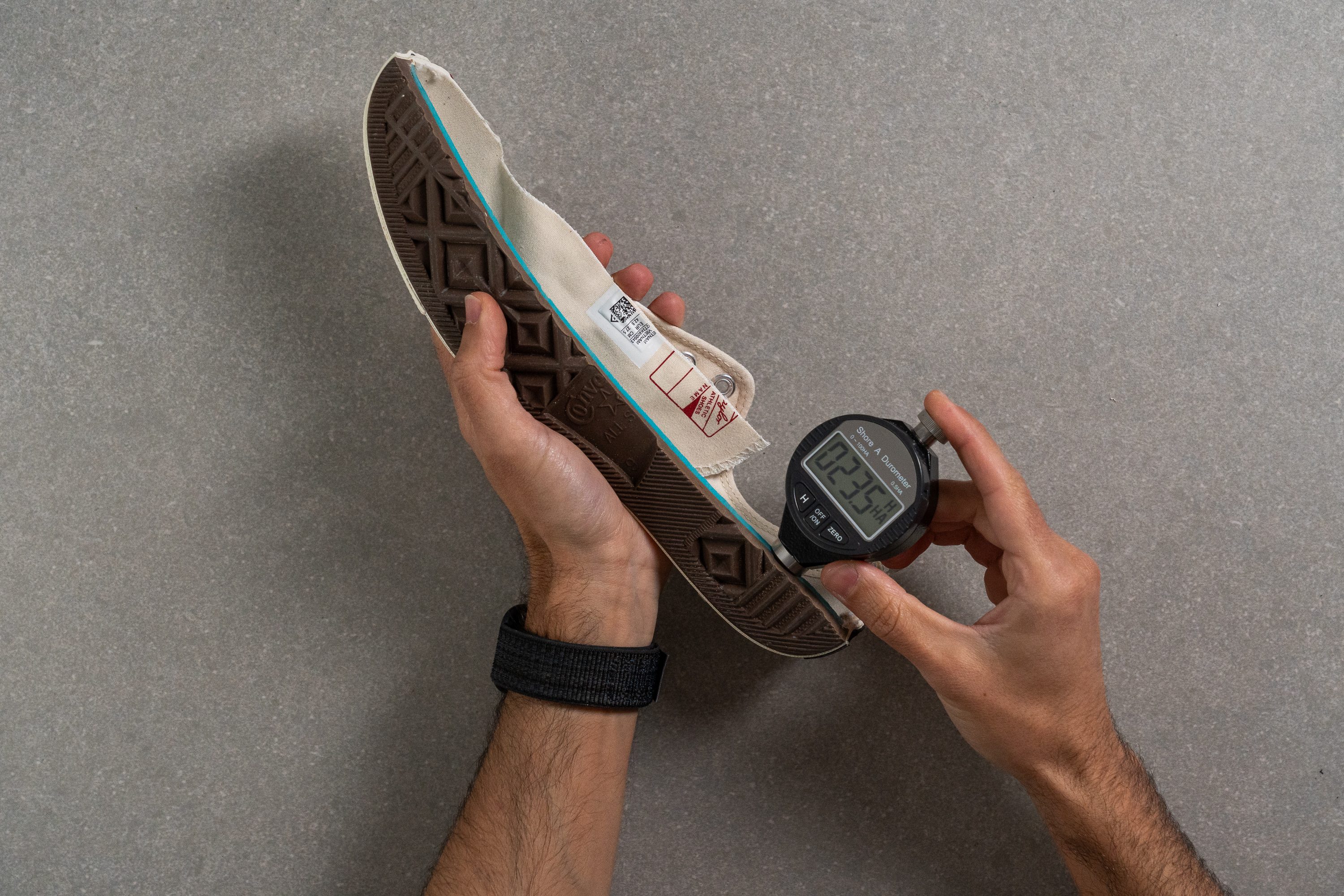
| Chuck 70 Low Top | 24.5 HA |
| Average | 28.6 HA |
Size and fit
Size
Converse Chuck 70 Low Top fits slightly large (231 votes).
Internal length
| Chuck 70 Low Top | 280.0 mm |
| Average | 272.3 mm |
Width / Fit
Converse shoes have always been known for their snug fit and the Chuck 70 is no exception.
Even though it has the same toebox width in the widest part (99.7 mm) it feels constricted because of the rubber sidewalls and an aggressively tapered toebox.
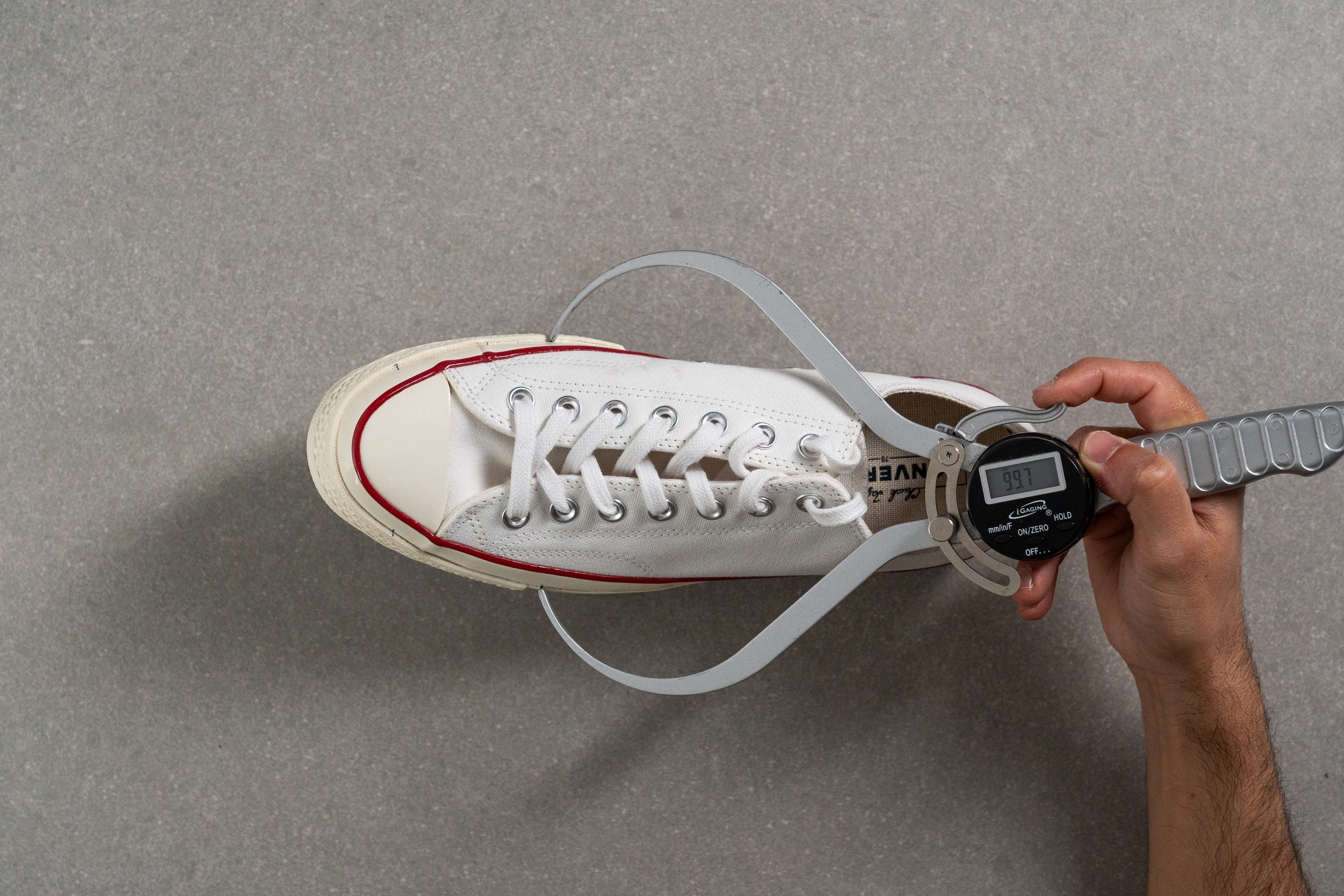
Gladly, the Chuck 70 silhouettes are now available in wide widths as well! You can get a little more breathing room by going for the wide version, even if you have medium-width feet.
This test follows an older methodology, which is why you don't see recently tested shoes in the chart. Results from different methodologies can not be compared.
| Chuck 70 Low Top | 99.7 mm |
| Average | 99.0 mm |
Toebox width
Most sneakers get narrower around the toes but the Chuck 70 does so to a greater extent. Measuring its toebox width where the big toe ends, our caliper showed as little as 63.7 mm.
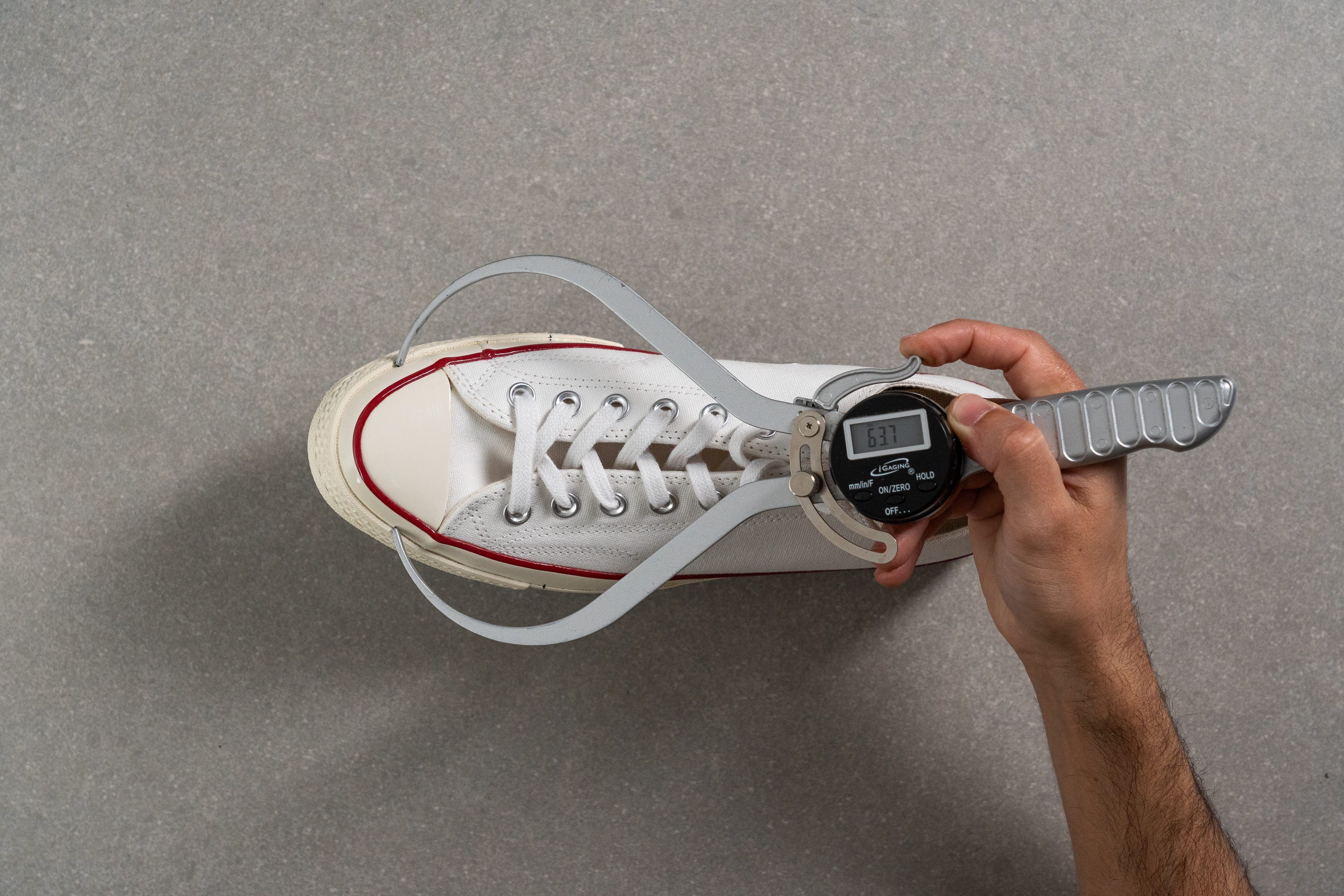
In the photo below, you can see how narrow the shoe is in a side-by-side comparison with the average sneaker.
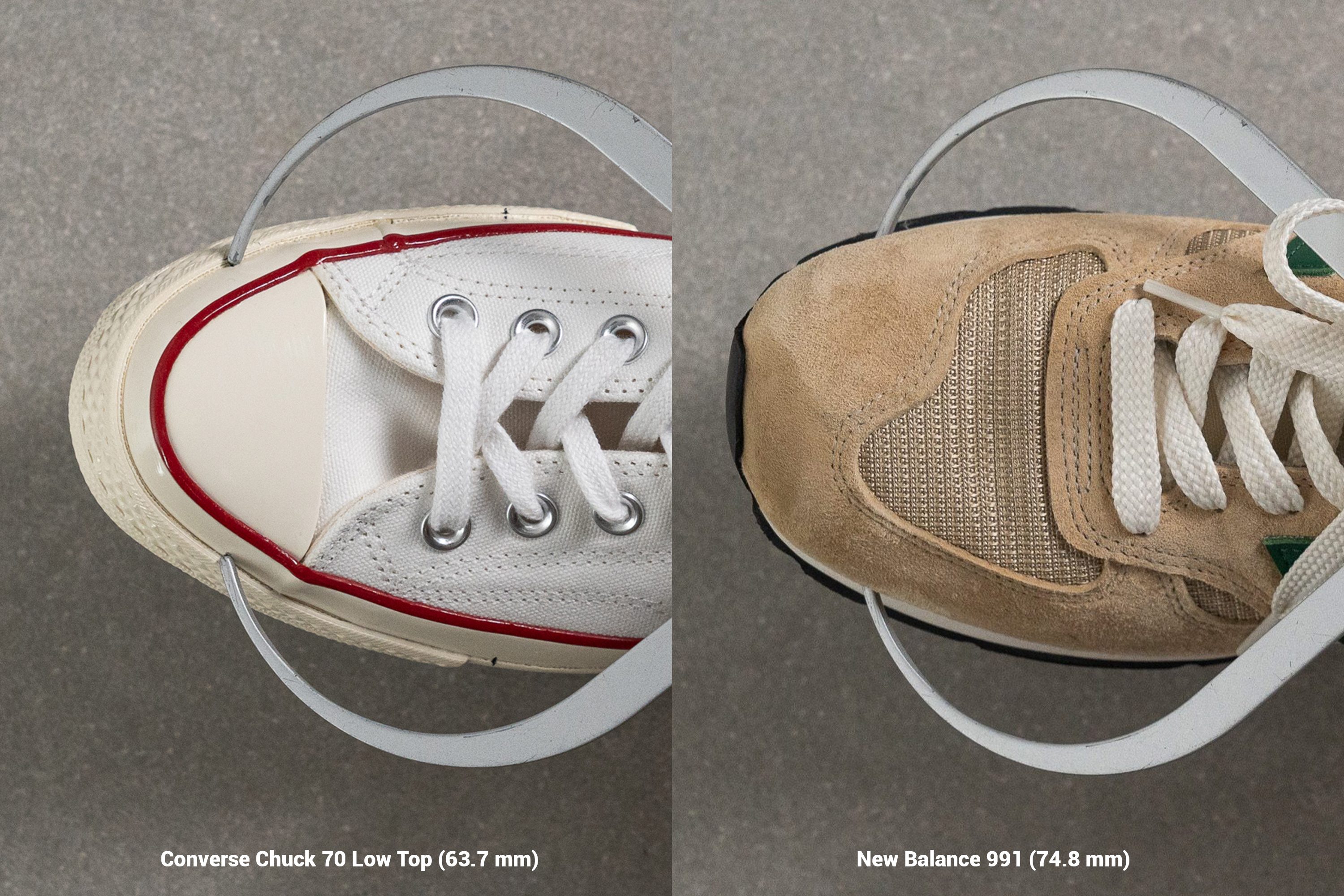
This test follows an older methodology, which is why you don't see recently tested shoes in the chart. Results from different methodologies can not be compared.
| Chuck 70 Low Top | 63.7 mm |
| Average | 75.0 mm |
Flexibility / Stiffness
The shoe's flexible design is one of its standout features. Despite its quite aggressive vulcanized sole and rubber taping, this Converse shoe bends effortlessly with the foot.
As our stiffness test showed, the Chuck 70 required only 14.8N (Newtons) to be bent to a 90-degree angle. That's a good 50% less than it takes an average sneaker!
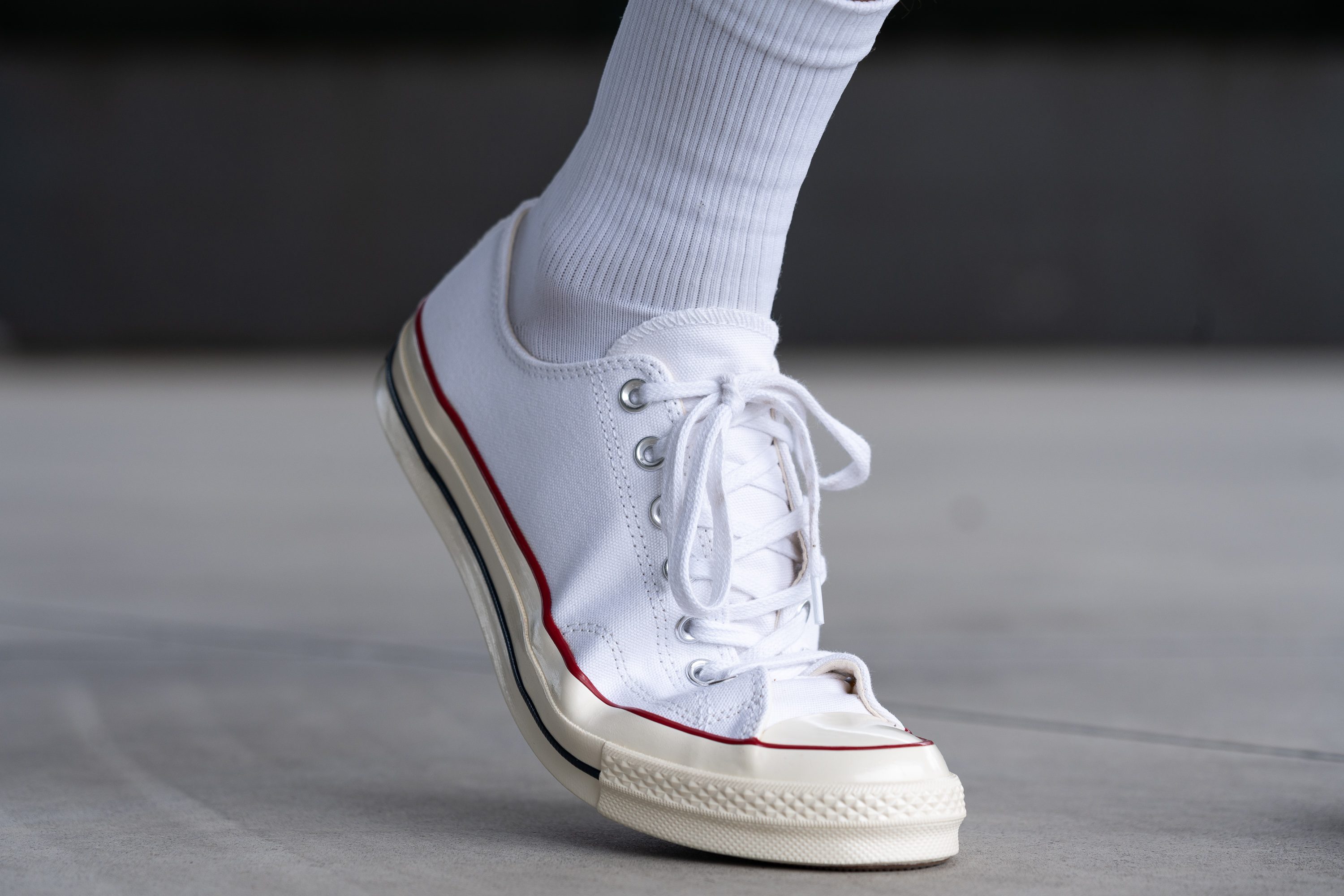
We also noticed that the rubbery overlay is glued to the canvas very well in the pinky-toe area. It looks much more promising than the one on the Chuck Taylor All-Star where it commonly gets unstuck.
This test follows an older methodology, which is why you don't see recently tested shoes in the chart. Results from different methodologies can not be compared.
| Chuck 70 Low Top | 14.8N |
| Average | 23.3N |
Weight
Even though it is a very minimal sneaker, the Chuck 70 Low Top weighs slightly heavier than average. At 16.0 oz (454g) in a men's US size 9, it is about 2 oz heavier than the standard low-top kick.
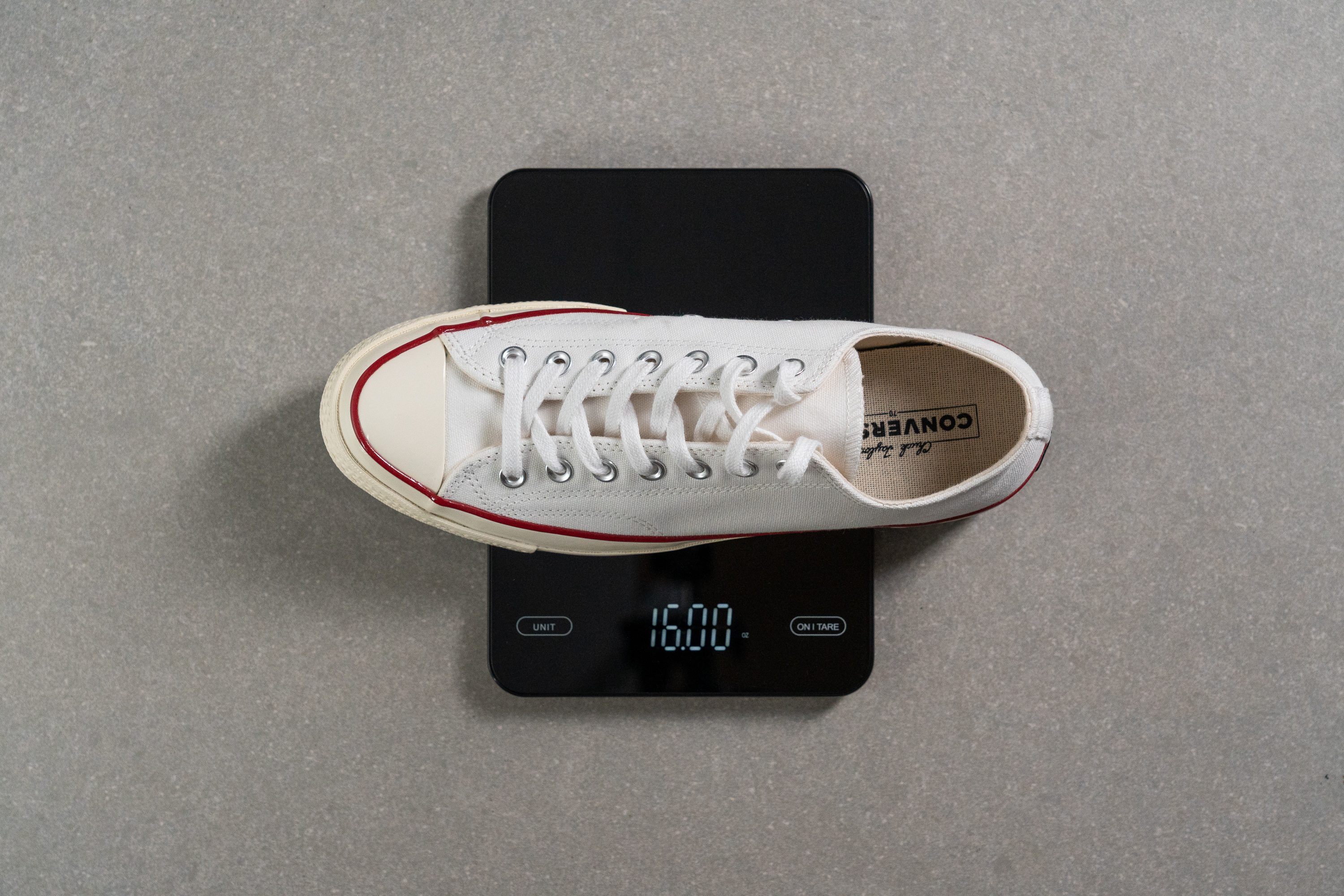
This is primarily due to the shoe's sturdy taping with tall rubber sidewalls. But canvas is also a heavier upper material than mesh.
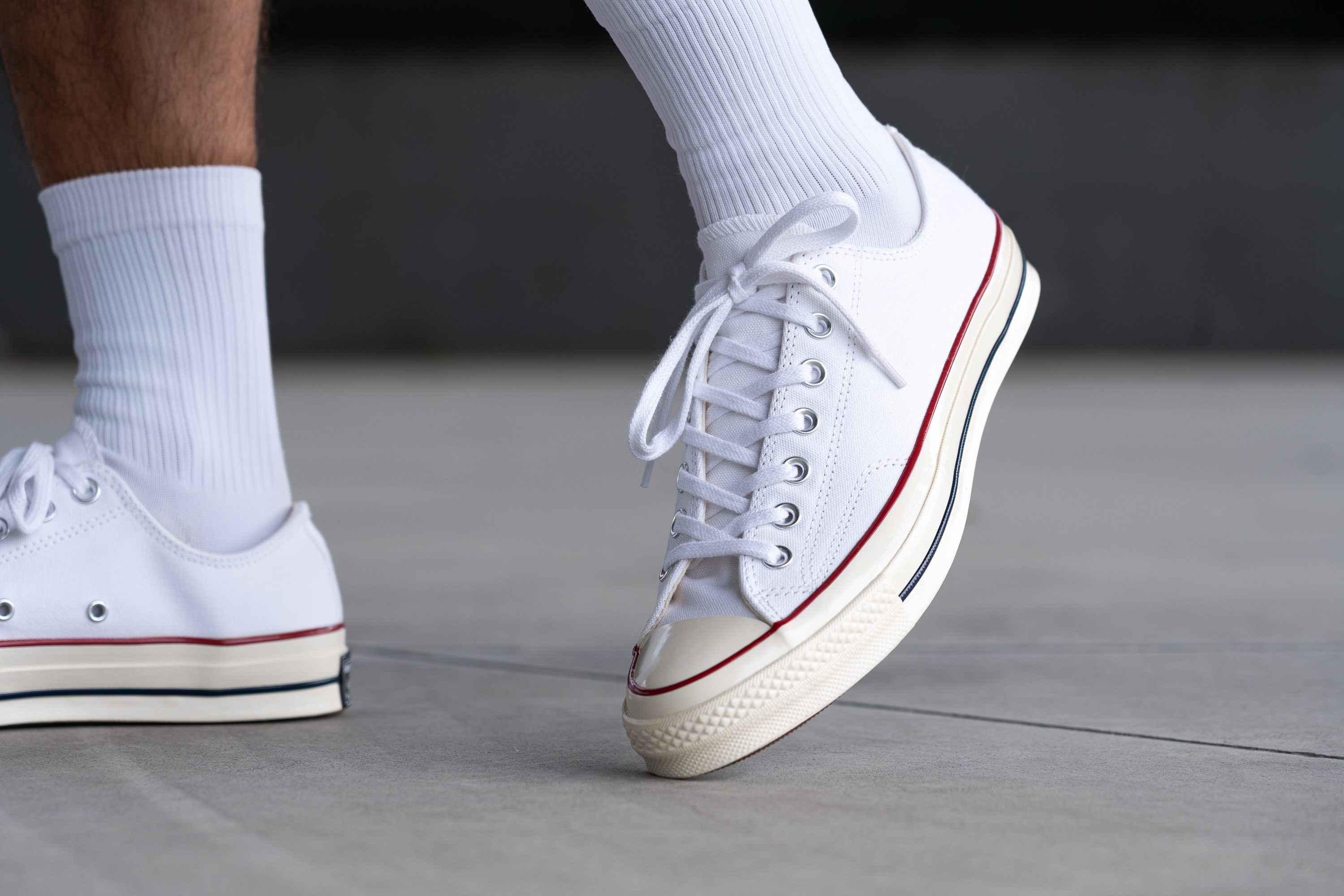
For reference, it weighs the same as the New Balance 550.
| Chuck 70 Low Top | 16.0 oz (454g) |
| Average | 13.8 oz (390g) |
Breathability
Think twice before you choose the Converse Chuck 70 as your go-to summer sneaker. We found that its heat-trapping canvas upper is not the best companion for high temperatures and keeping your feet odor-free.
In a side-by-side comparison with a mesh sneaker, the Chuck 70 clearly loses the breathability battle. The shoe barely allows any smoke to pass through its upper in our smoke-pumping test.
Even when we hovered its half-cut upper over the light, we couldn't see any additional ventilation sources besides the eyelets and the two eyelet-like apertures on the inner side. By the way, the latter don't contribute to the shoe's breathability that much.
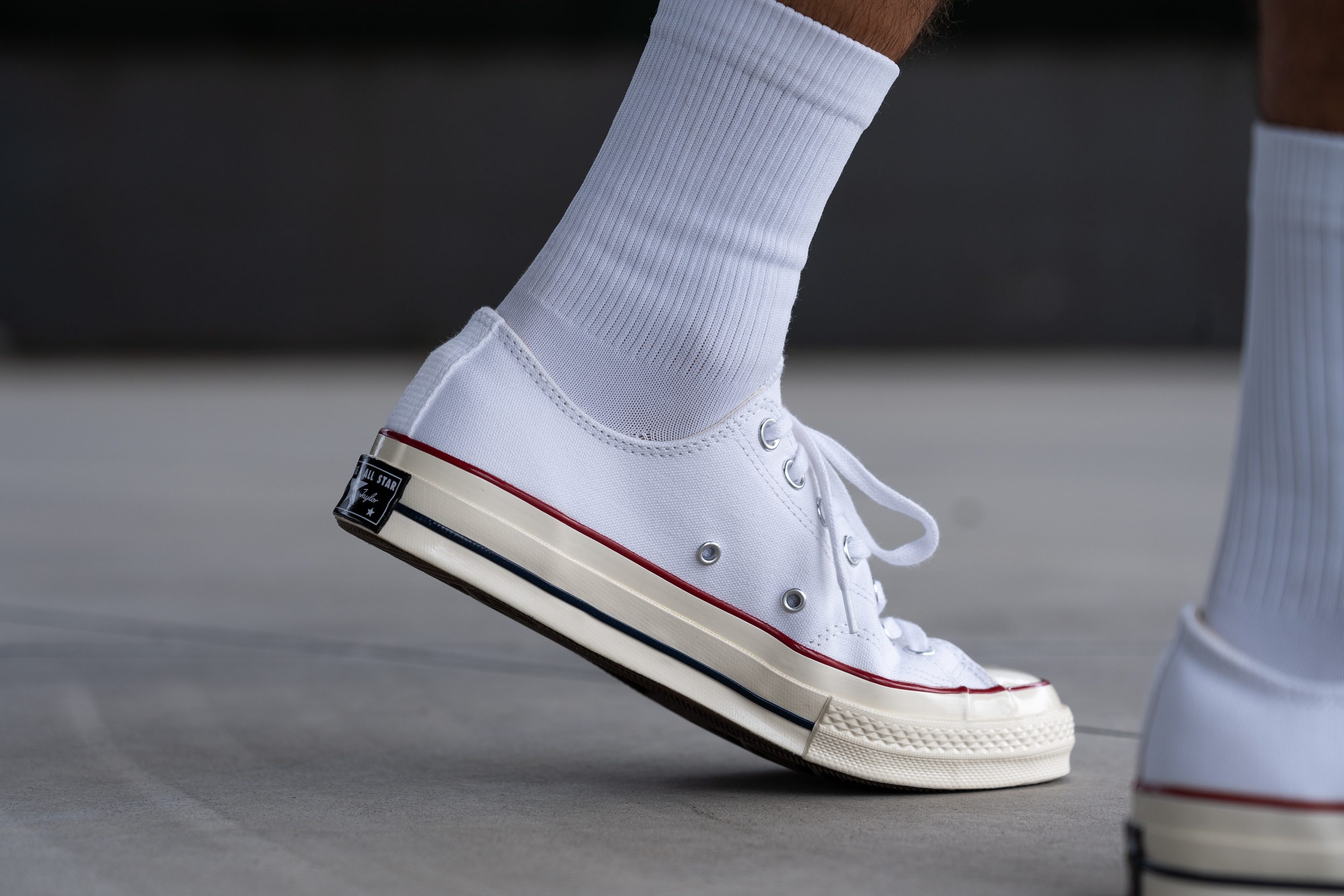
We gave the shoe's upper a final check through our microscope and it only proved that its canvas upper is not porous at all.
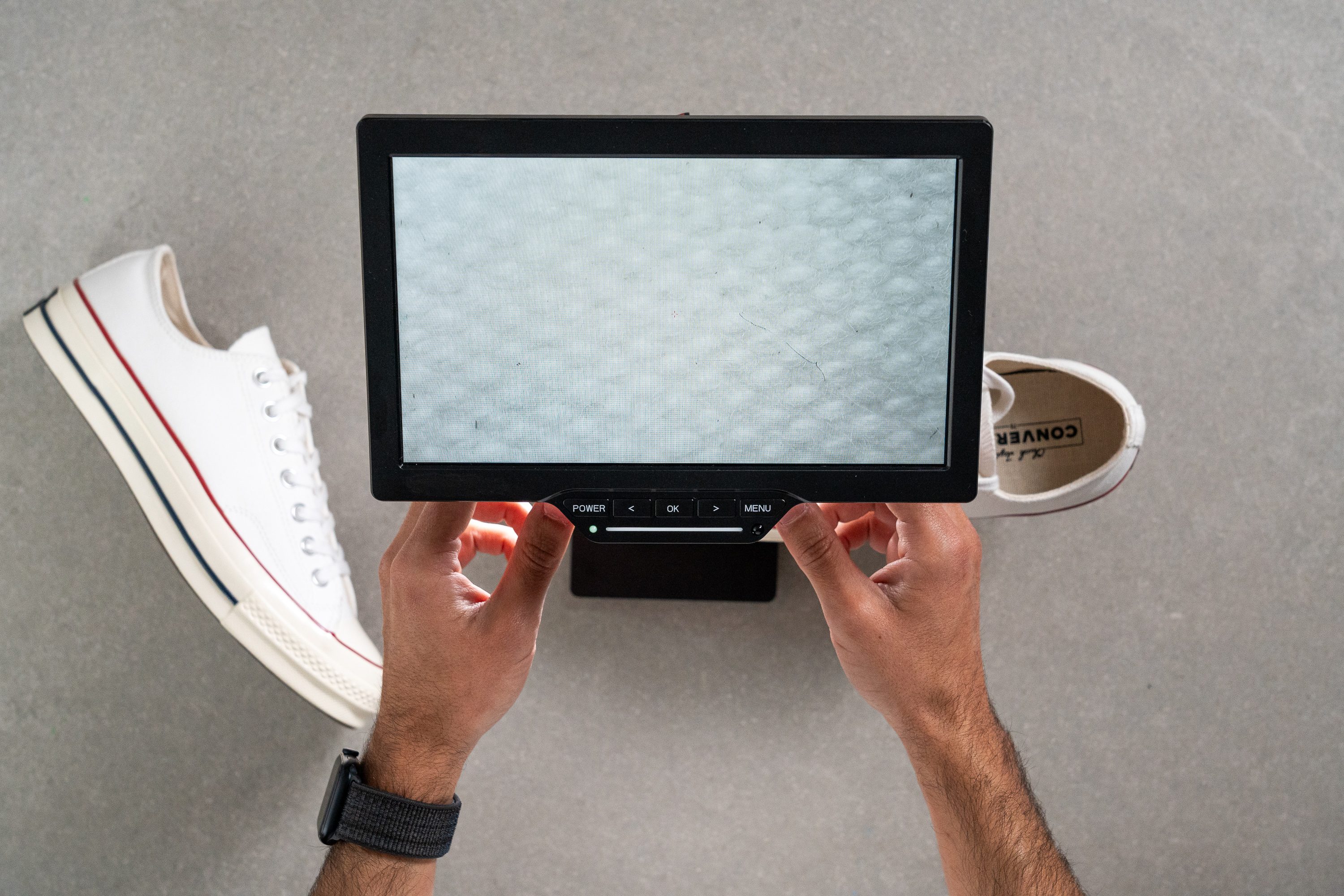
To sum it all up, the Converse Chuck 70 Low Top is a poor choice for hot weather but can feel quite comfortable on cooler summer nights and in the transitional seasons.
On a scale from 1 to 5, where 5 is the most breathable, we couldn't rate this sneaker higher than 2.
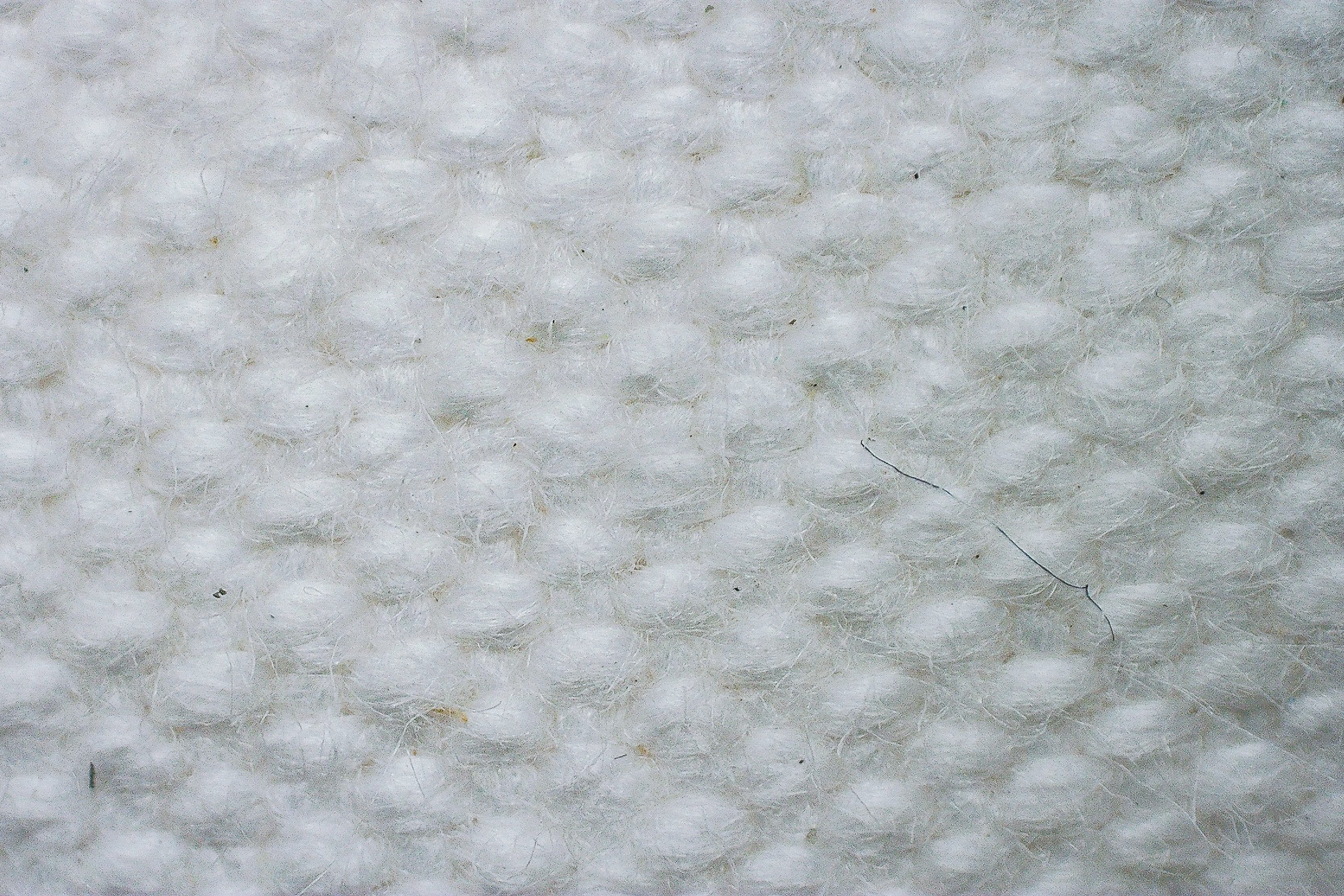
| Chuck 70 Low Top | 2 |
| Average | 3 |
Stability
Lateral stability test
The Converse Chuck 70 Low made us feel quite surefooted thanks to its firm and grounded sole as well as tall rubber sidewalls.
However, it is important to note that this sneaker does not have enough arch support or lateral stability for spending all day on your feet. We also cannot recommend this Converse kick to people with flat feet and overpronation.
Sneakers from New Balance and ASICS are designed to have much better support for these conditions.
Torsional rigidity
It may seem like the Chuck 70 Low Top has a lot of structure and rigidity to it. But in reality, it is amazingly pliable!
We were able to bend and twist the shoe freely, with very little effort in our manual test. On a 1-5 scale, where 1 is the most flexible, we rated the shoe's torsional rigidity as 2.
You're not getting much support from this kick but it gives you the freedom of movement in return. We promise that you won't feel restricted dancing to your favorite songs at a music festival.
| Chuck 70 Low Top | 2 |
| Average | 3.6 |
Heel counter stiffness
Unlike most other sneakers, the Chuck 70 has no heel counter whatsoever. With pure canvas wrapping around the heel, we felt no added support at the rearfoot.
Even though the shoe's taping is very thick (35 mm), it's not tall enough to cover up the heel sufficiently either.
| Chuck 70 Low Top | 1 |
| Average | 3.2 |
Midsole width - forefoot
As part of the shoe's heritage, the Converse Chuck 70 has a very narrow profile.
Even in the widest part of its sole, our caliper showed only 102.1 mm which is a few good millimeters narrower than average.
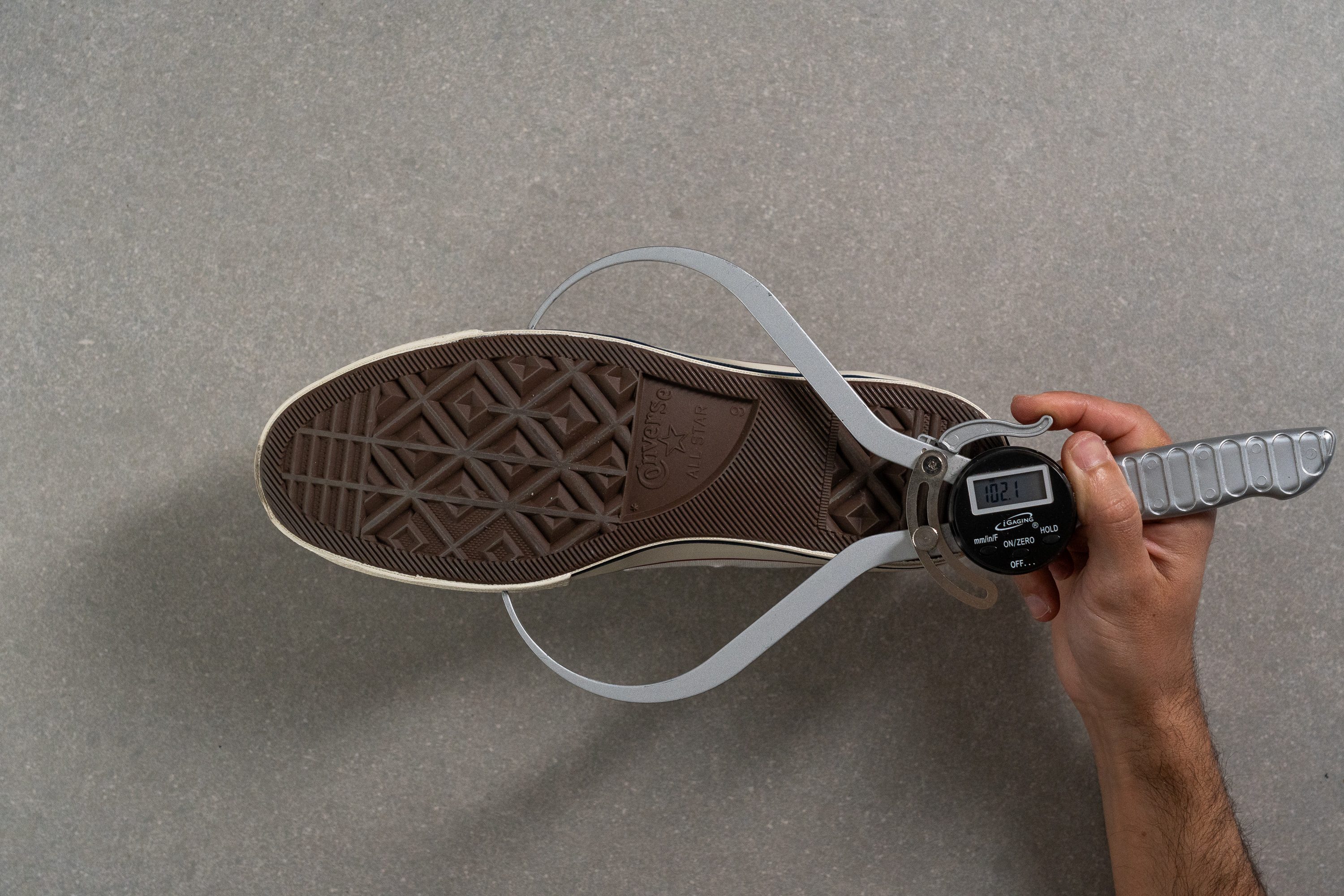
| Chuck 70 Low Top | 102.1 mm |
| Average | 108.9 mm |
Midsole width - heel
The shoe also comes with a very narrow heel which can compromise stability for those of us with excessive pronation.
In the widest part of the heel, we measured 73.9 mm which is a whole 10 mm narrower than average.
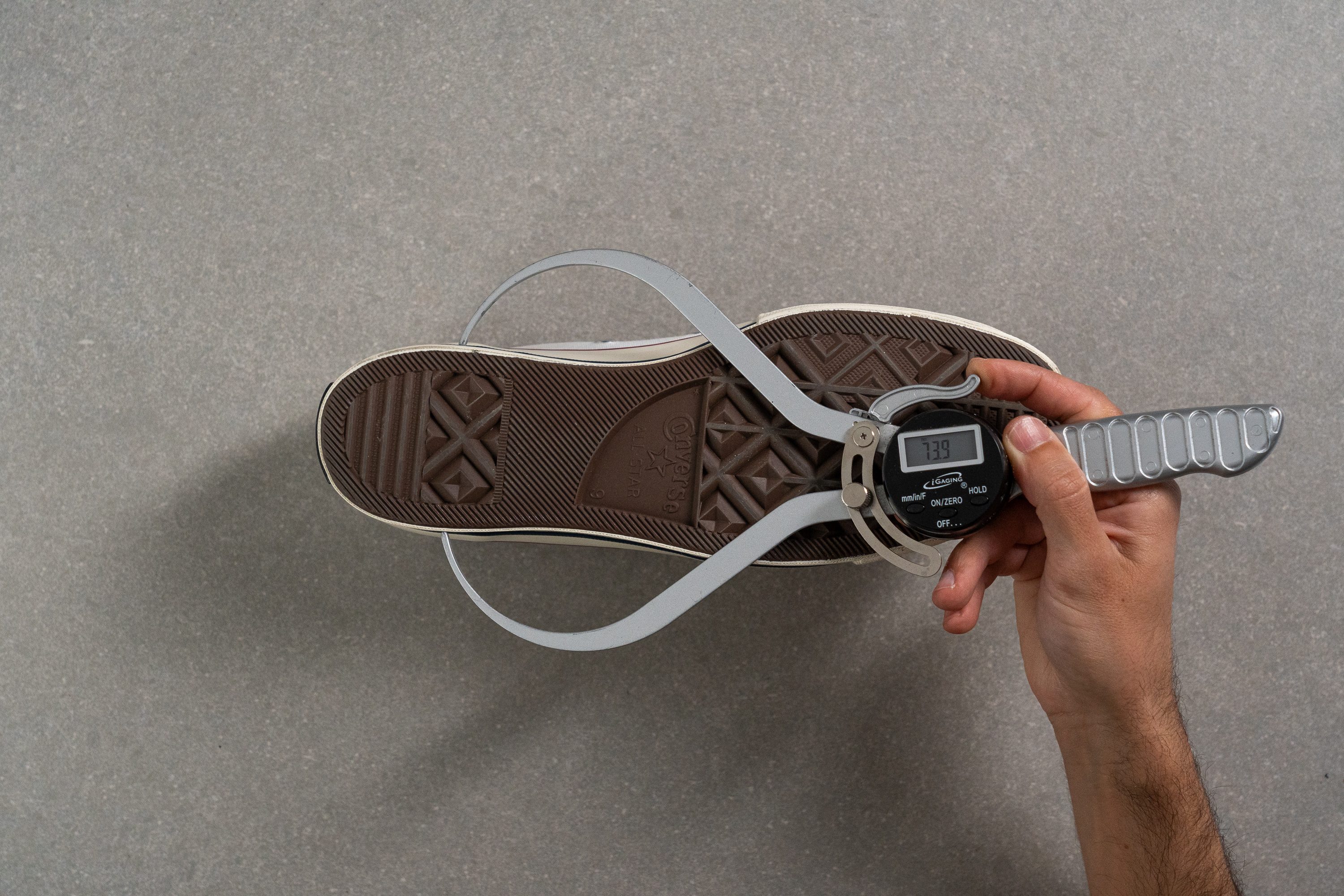
| Chuck 70 Low Top | 73.9 mm |
| Average | 84.0 mm |
Durability
Toebox durability
The Chuck 70 sneaker inherited a very sturdy toecap from its '70s ancestor. It helps this Converse kick outlast many other sneakers.
To test exactly how much abuse this Chuck can take compared to other sneakers, we drilled its toebox with a Dremel.
The speed was set to 5K RPM and the pressure remained consistent at 3.2N while we applied the sandpaper tip for 12 seconds.
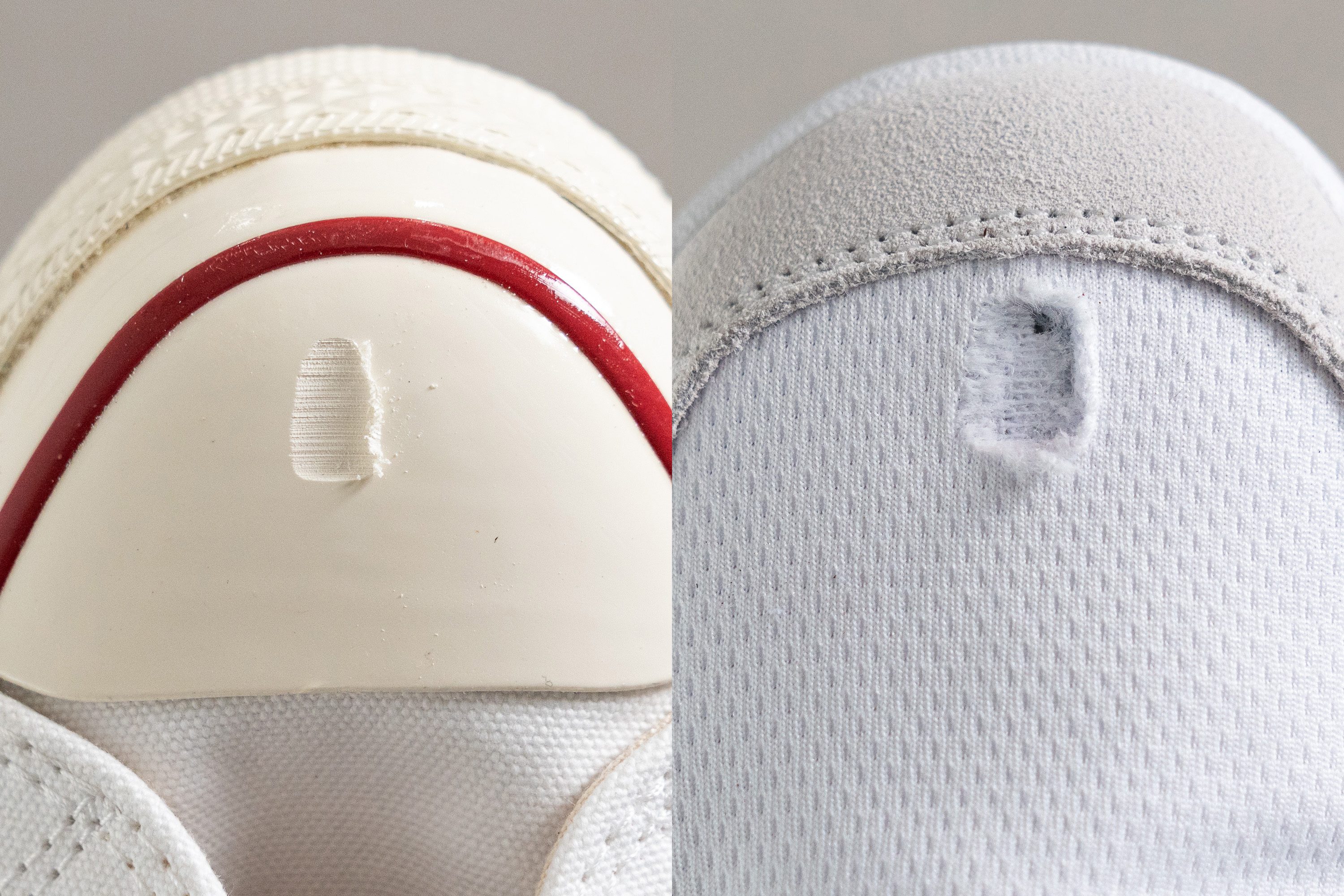
The result was astounding! The Chuck 70's toe cap got away with a cosmetic scuff where most kicks develop a see-through hole!
We didn't hesitate to rate the shoe's toebox durability with a high score of 4 out of 5.
| Chuck 70 Low Top | 4 |
| Average | 3.7 |
Heel padding durability
On the flip side, the shoe's inner lining isn't as wear-resistant as its outer shell.
Lined with a softer kind of canvas, it took our Dremel less than 4 seconds to tear up the textile inside the heel counter.
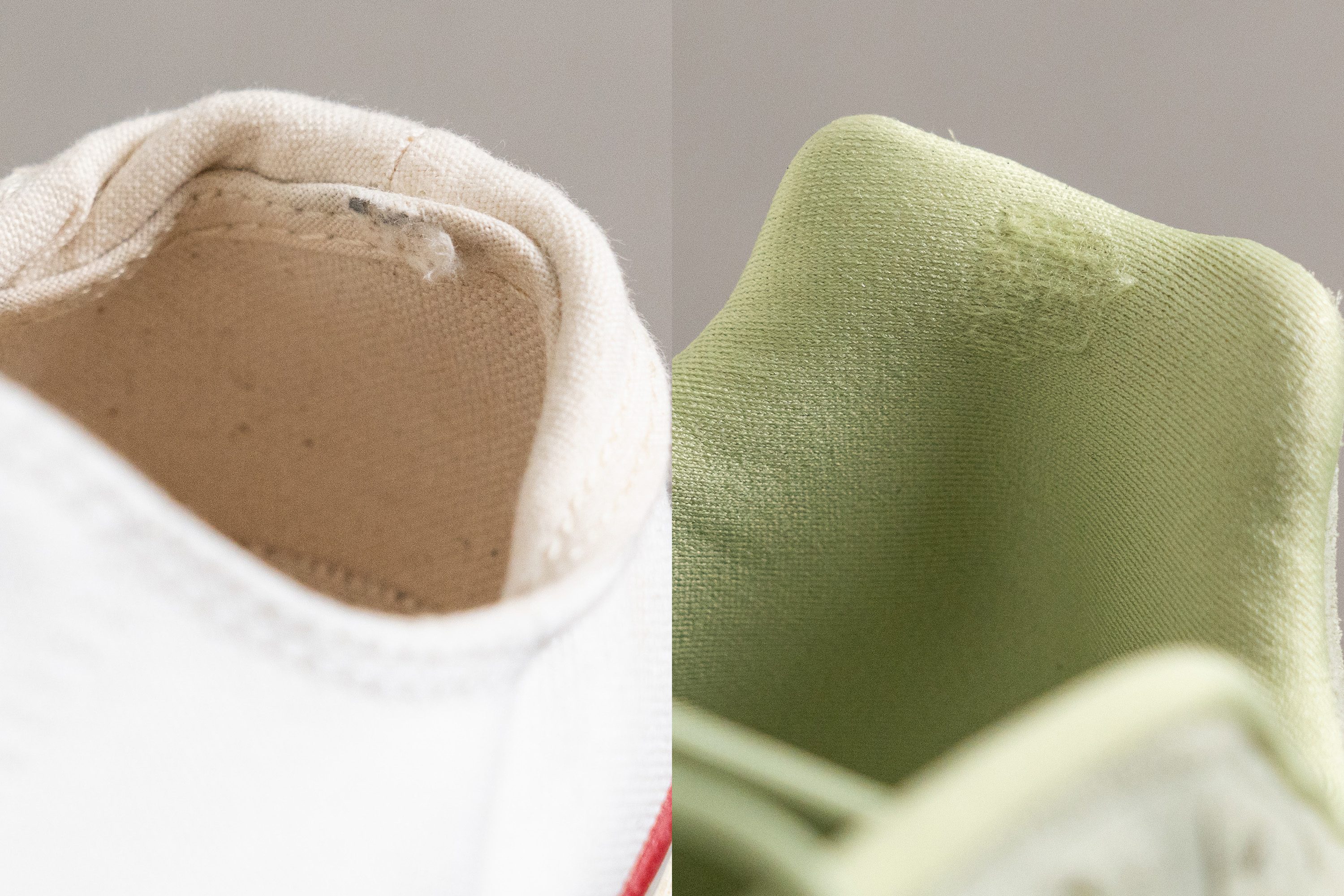
Considering how much friction occurs in this area, we think that it won't be long before you see some wear on this side of the collar.
On a 1-5 durability scale, we couldn't rate it higher than 2.
| Chuck 70 Low Top | 2 |
| Average | 3.2 |
Outsole hardness
Based on our extensive lab data, sneakers with harder rubbers tend to have better abrasion resistance.
That's why we were glad to see a standard level of outsole hardness on the Chuck 70 Low Top. With a durometer reading of 83.0 HC, it is the same as the industry average which is a good sign.
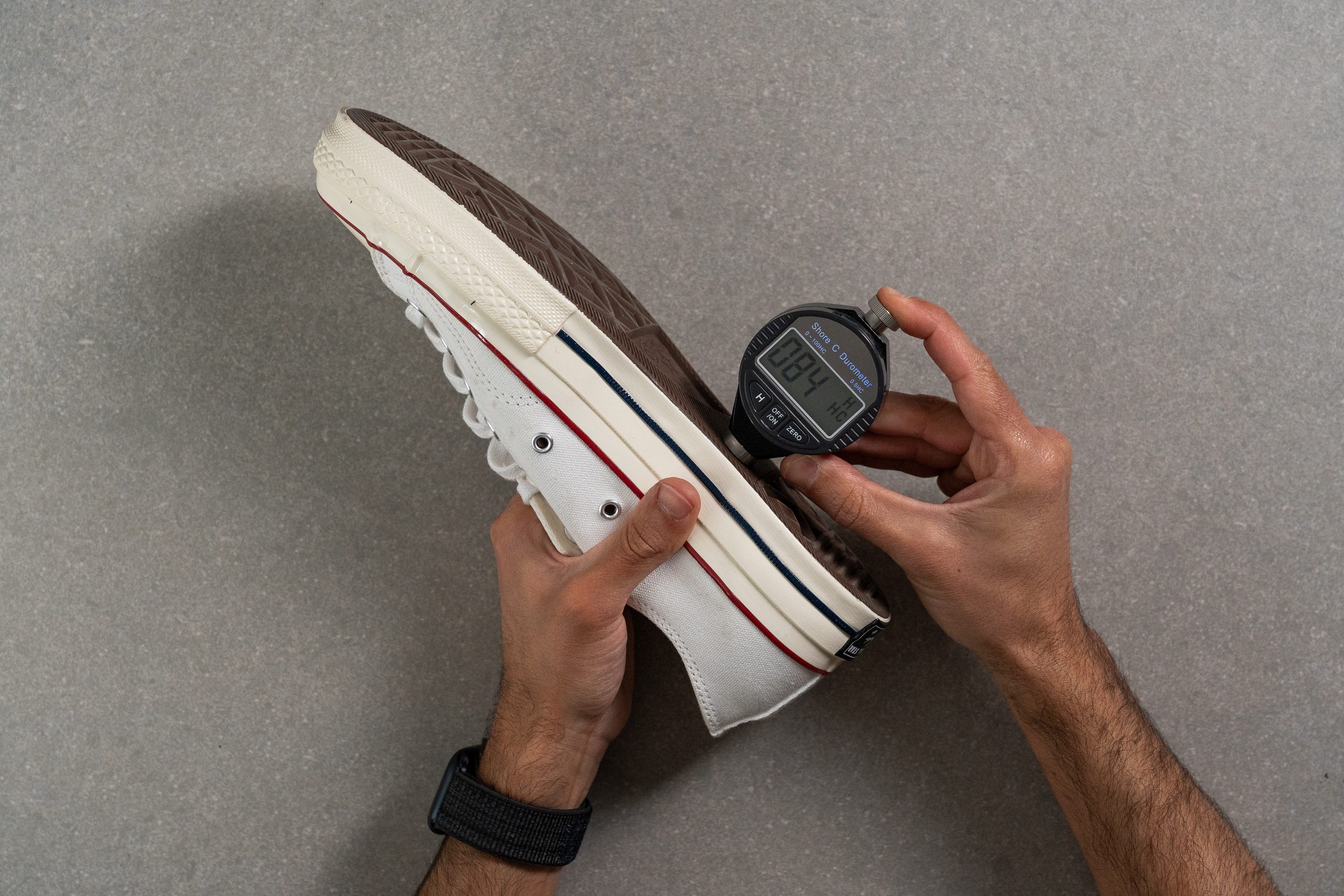
| Chuck 70 Low Top | 83.0 HC |
| Average | 85.7 HC |
Outsole durability
Equipped with a Dremel, we tested the limits of the Chuck 70's outsole for 22 seconds. The speed was set to 10K RPM this time.
Despite the minor tread loss, the shoe's rubber stood up to the challenge quite well.
Our tread gauge shows that the depth of the dent was only 1.1 mm. This is the same as the average of our lab-tested sneakers.
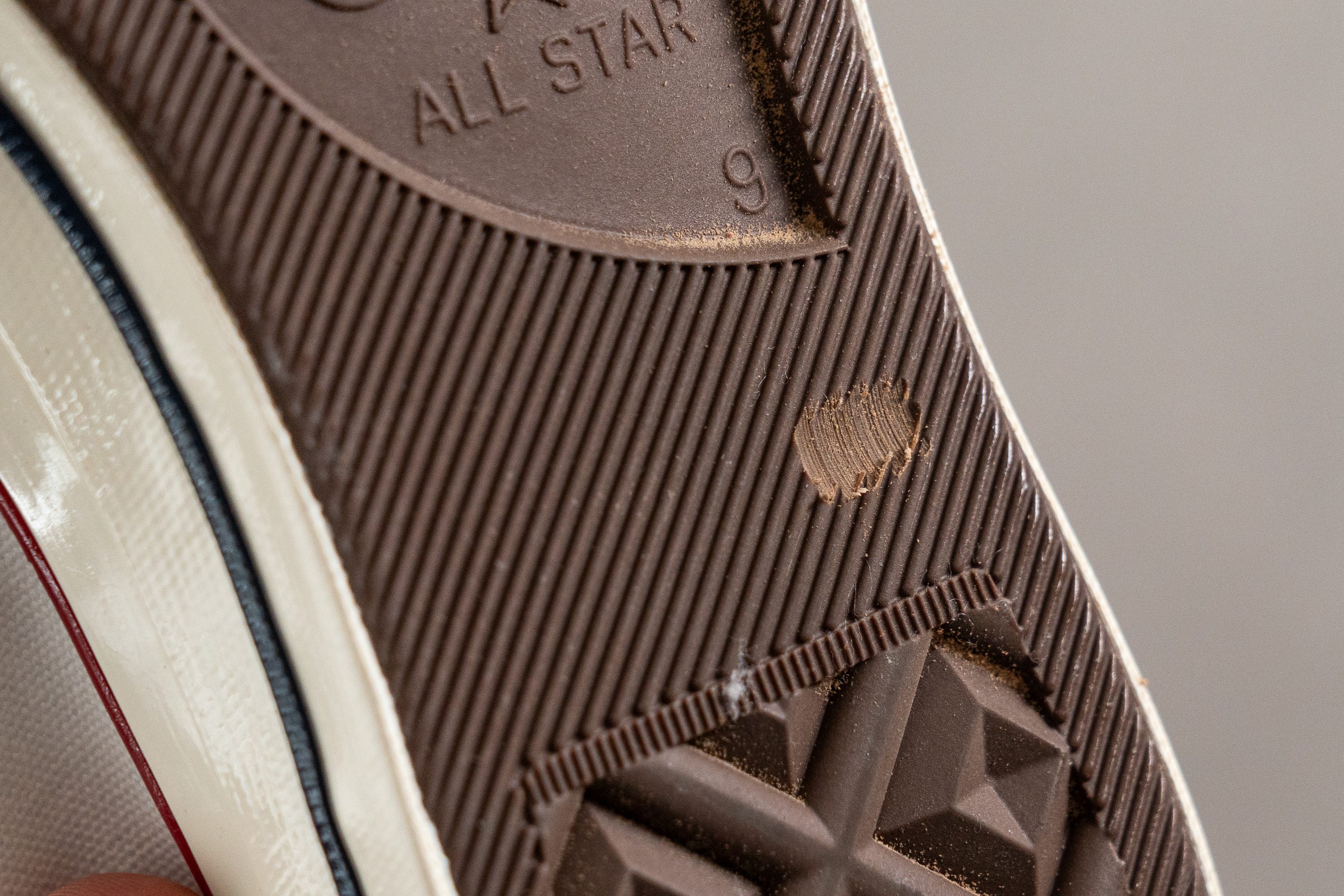
| Chuck 70 Low Top | 1.1 mm |
| Average | 1.1 mm |
Outsole thickness
In addition to great wear resistance, the shoe's outsole is also very thick. At 7.1 mm, it is notably thicker than average which contributes to its lifespan for sure.
All things considered, we think that the Converse Chuck 70 Low Top will last you well over a year, even with regular use.
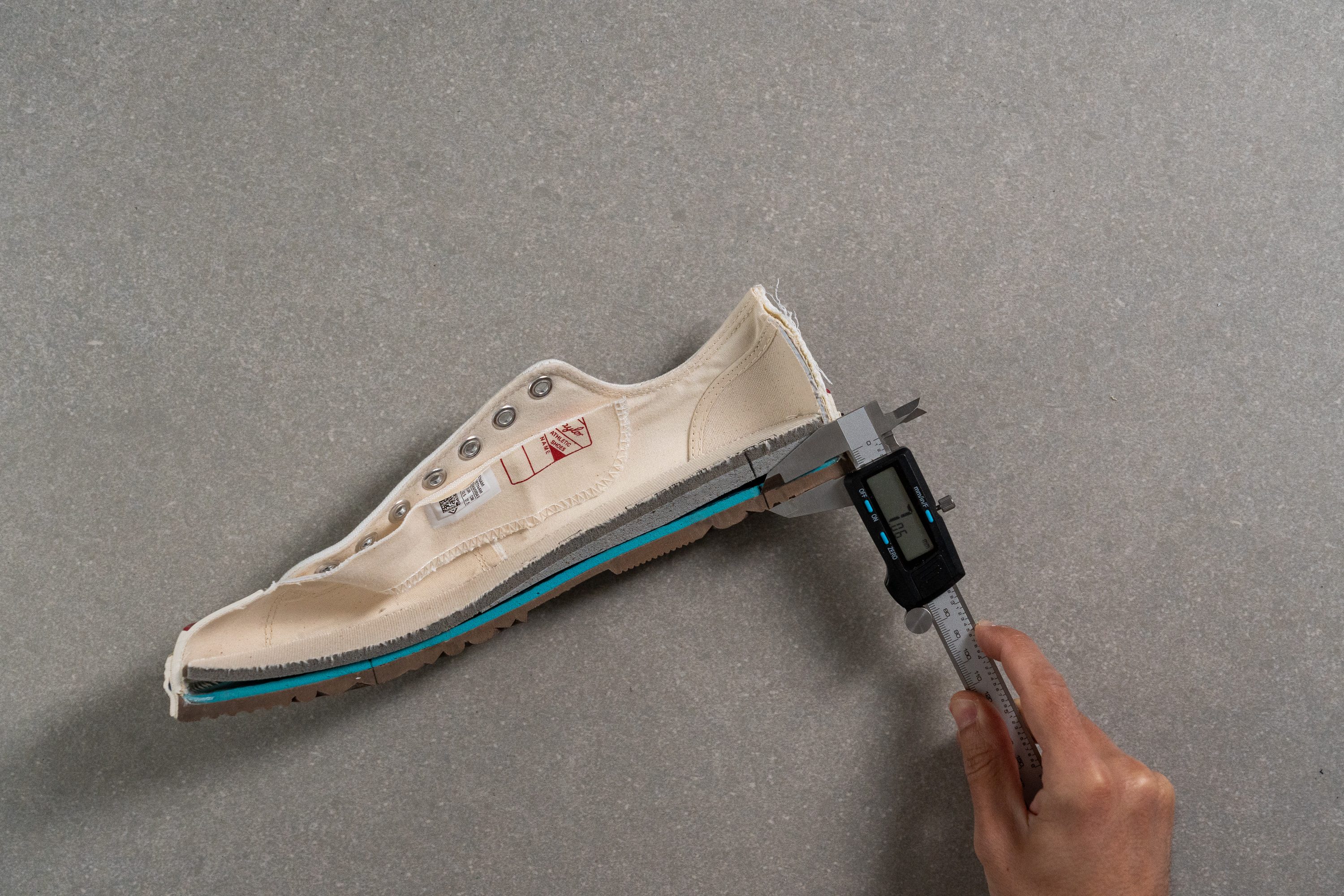
| Chuck 70 Low Top | 7.1 mm |
| Average | 5.3 mm |
Misc
Insole thickness
We found that the major part of the shoe's cushioning comes not from the midsole but from a very thick OrthoLite insole.
Measuring it with a caliper showed an impressive 12.9 mm in the heel!
It is one of the thickest removable insoles we've seen in lifestyle sneakers and it gives a huge comfort upgrade to the Chuck 70 compared to the original Chucks.
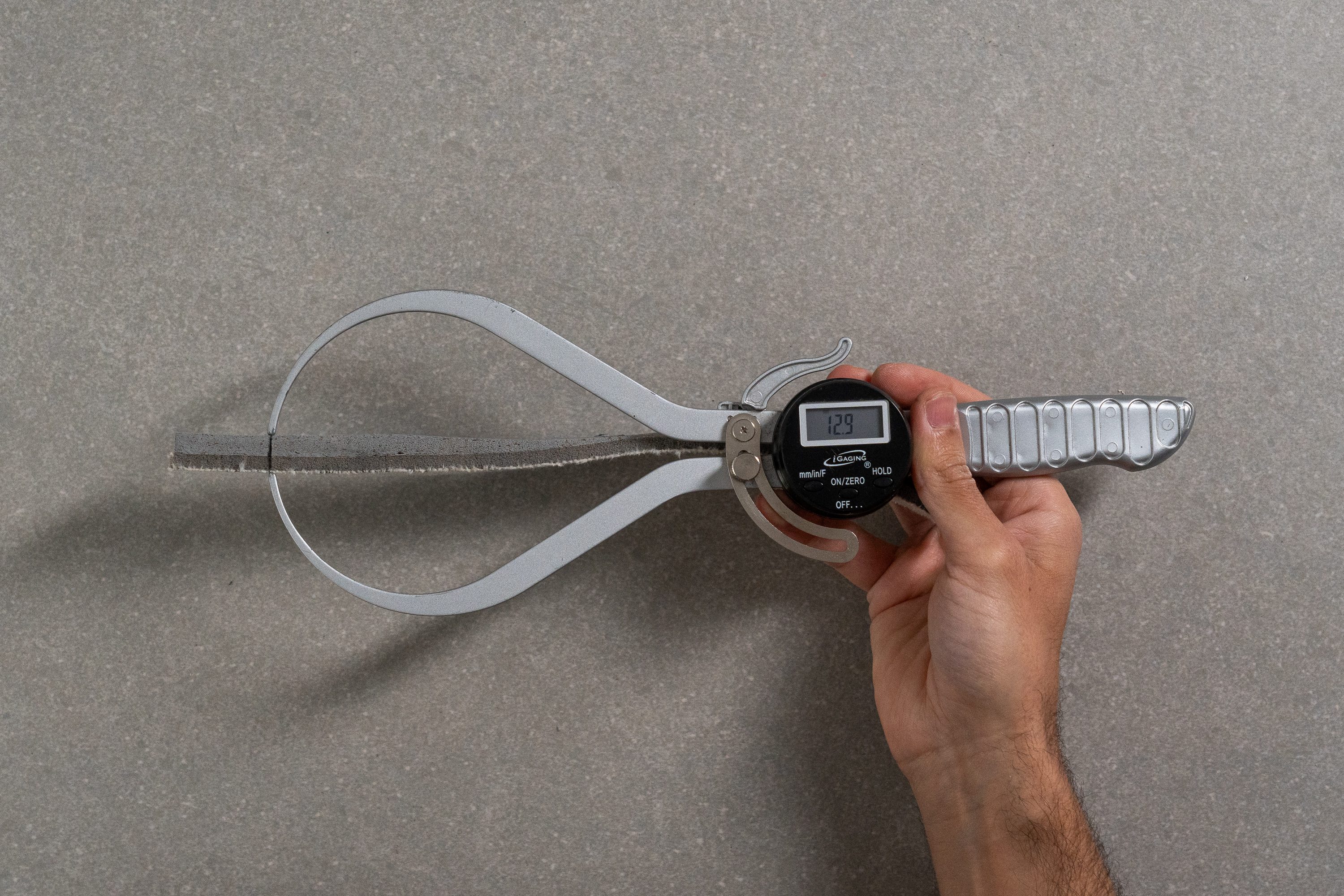
| Chuck 70 Low Top | 12.9 mm |
| Average | 5.1 mm |
Removable insole
A bonus point goes to the Chuck 70 for adding a removable insole (which is not available in the All-Star).
But if you plan to replace it with a custom orthotic, take into account that the shoe's stock insole is very thick (12.9 mm) and tapers towards the toes following the shape of the shoe. Not every over-the-counter insole can accommodate that.
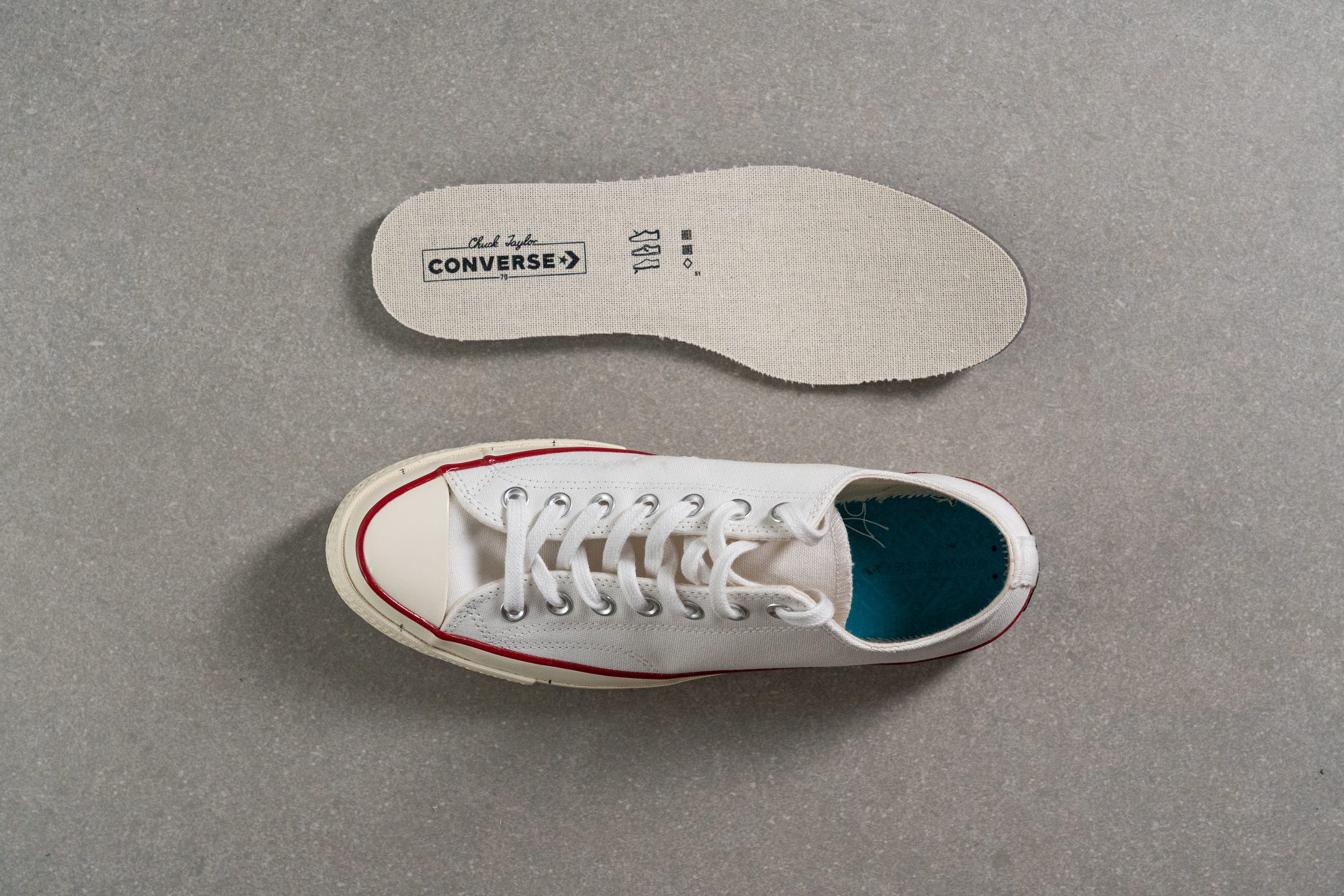
| Chuck 70 Low Top | Yes |
Reflective elements
The basic version of the Converse Chuck 70 Low Top has no reflective elements.
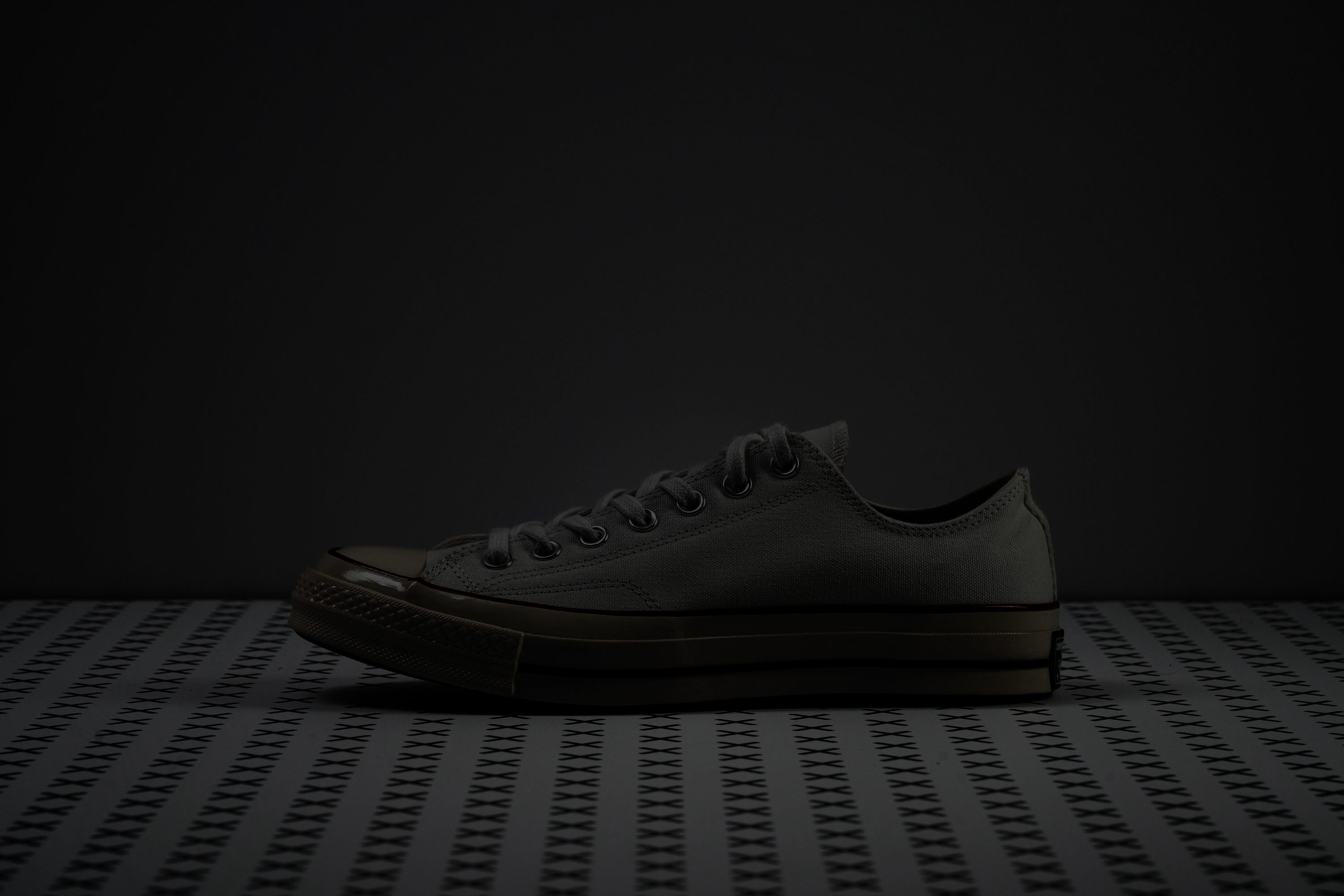
| Chuck 70 Low Top | No |
Tongue padding
The tongue is practically non-existent on the Chuck 70. It is made of canvas and has no additional padding. It merely serves as an interlayer between your skin and the metal eyelets.
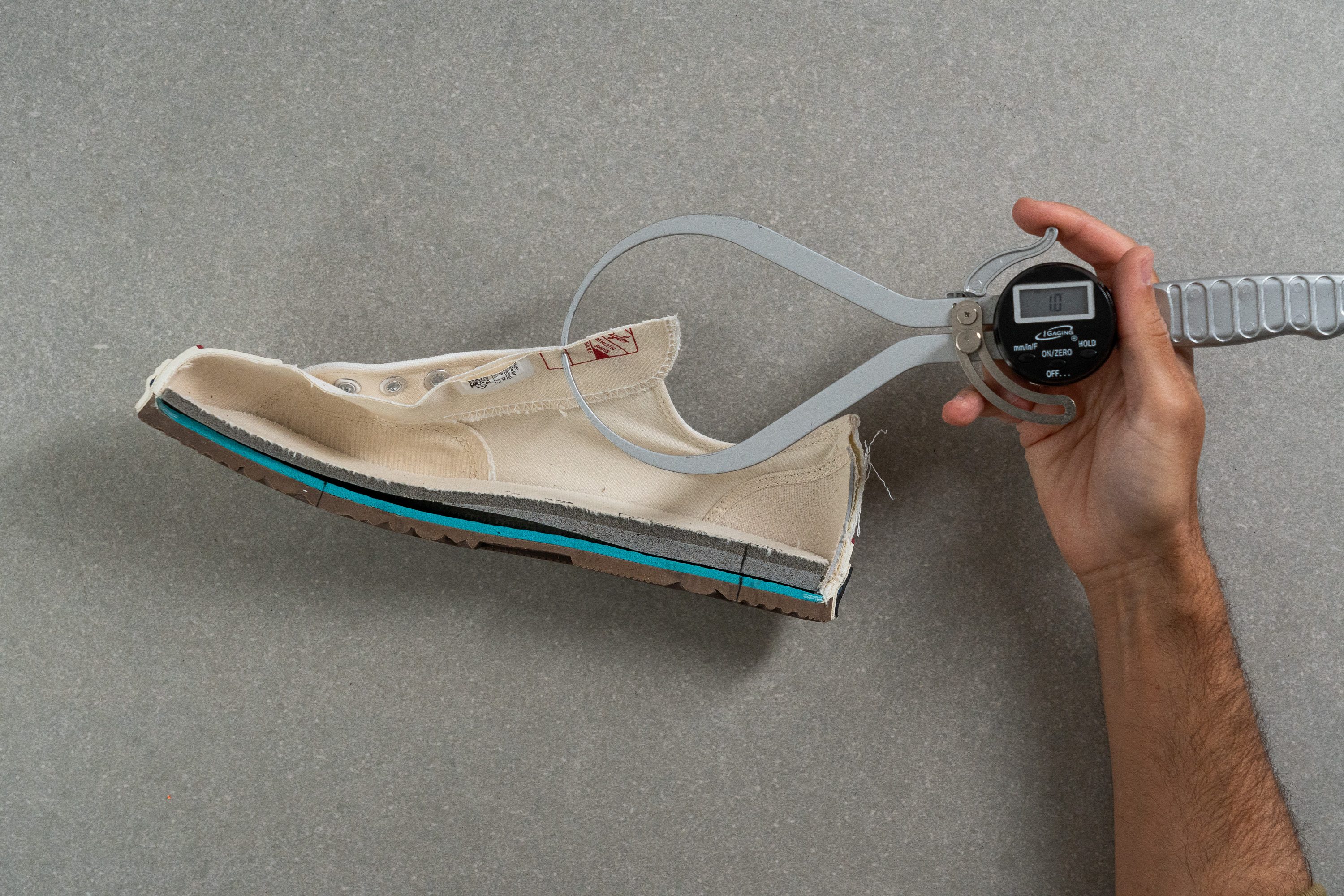
| Chuck 70 Low Top | 1.2 mm |
| Average | 9.6 mm |
Tongue: gusset type
This Converse shoe has a very basic non-gusseted tongue design. It means that the tongue is not attached to the sides of the upper with elastic straps as in some athletic shoes.
Because there is no lace loop either, there might be a slight shifting of the tongue sideways as you walk.
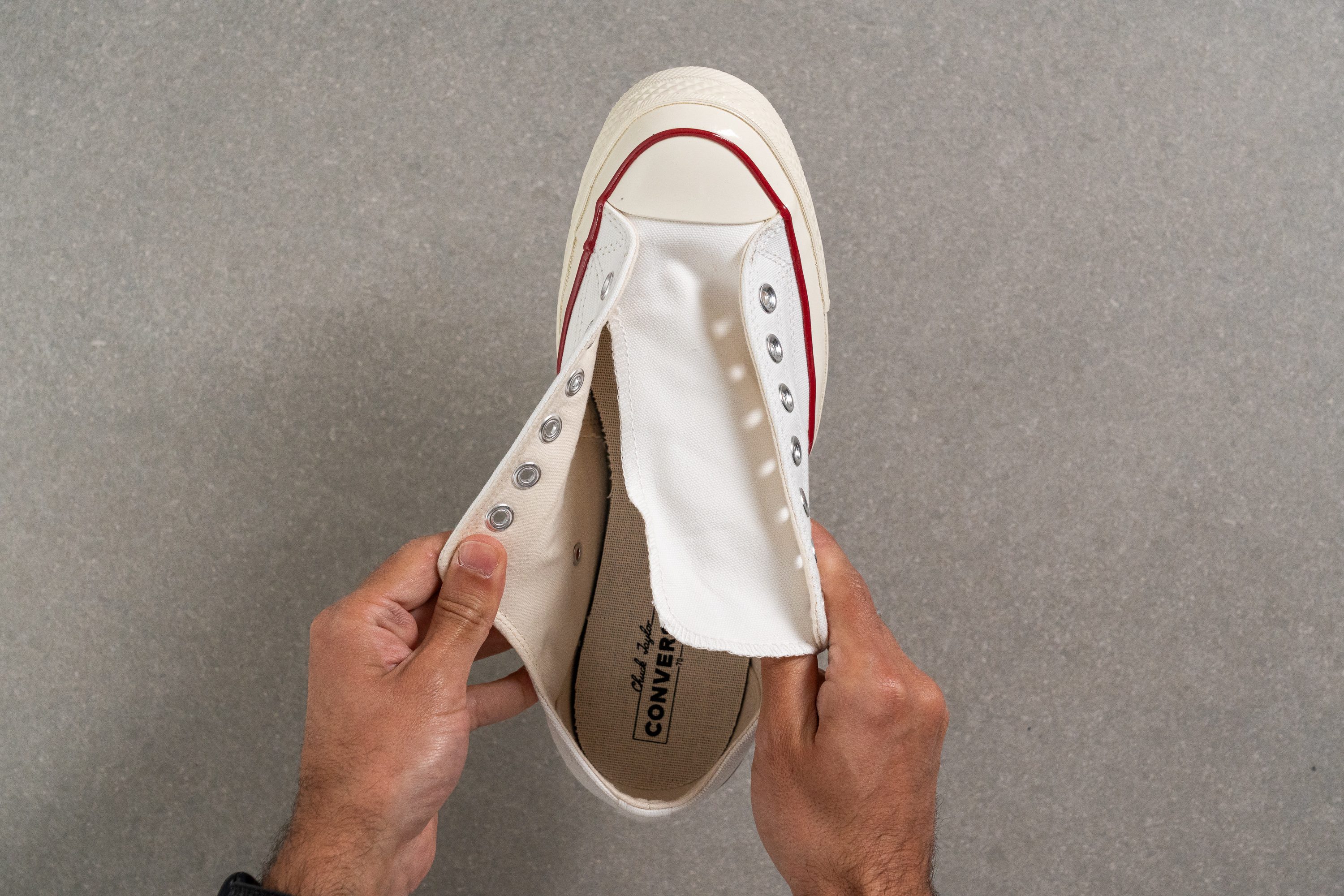
| Chuck 70 Low Top | None |
Heel tab
This Chuck sneaker doesn't have any pull tabs or finger loops. But you don't really need those as this low-top shoe offers an easy-breezy entry.
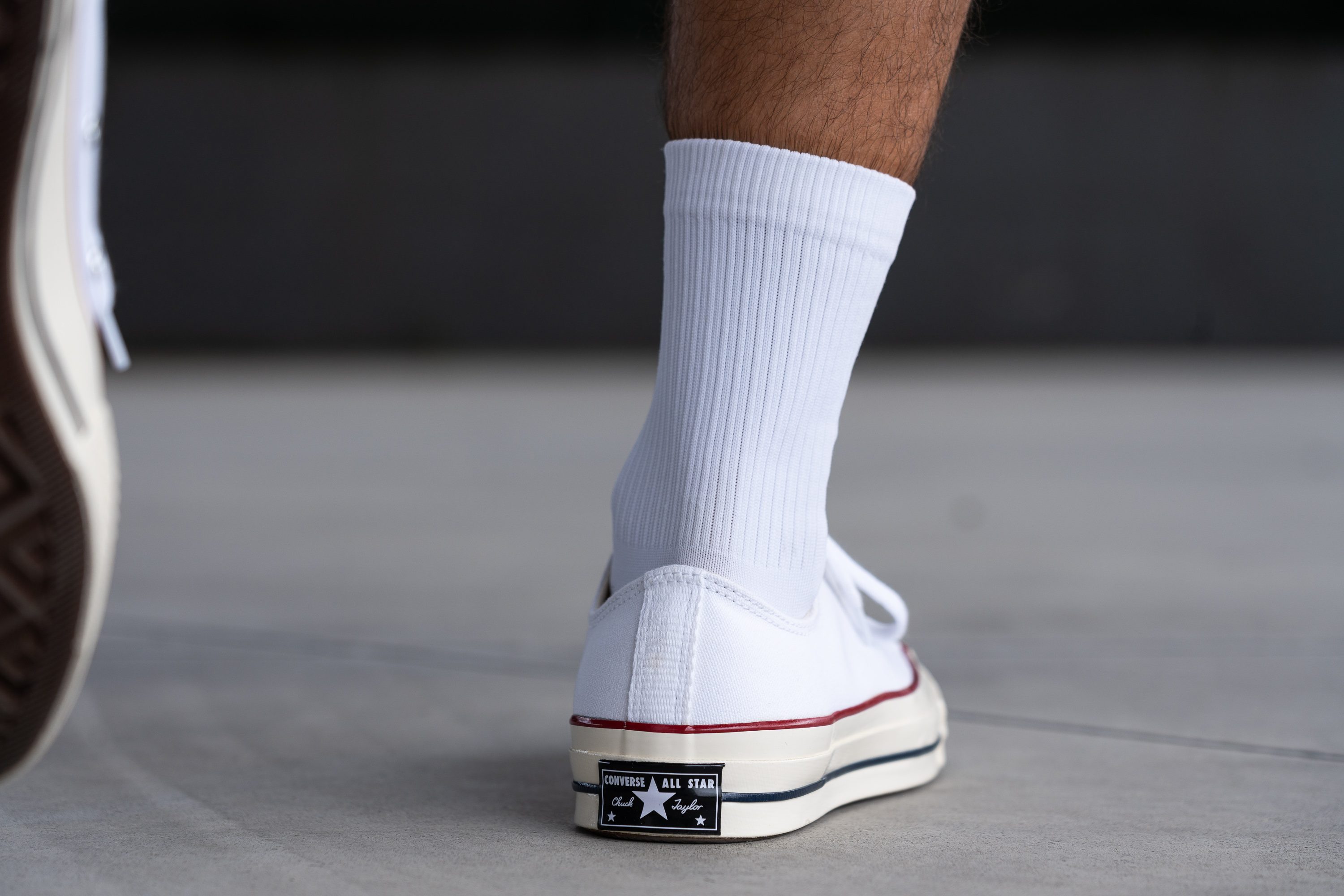
| Chuck 70 Low Top | None |
The origins of the Converse Chuck 70 Low Top
Building upon the acclaimed Converse All-Star, the Chuck 70 Low Top is nearly identical to the classic silhouette that never goes out of style.
The remarkable thing about these sneakers is how, after over 100 years, they have kept most of their original design—from the durable canvas fabric to the star logo patches and the simple vulcanized rubber soles —and yet, people still flock to buy them.
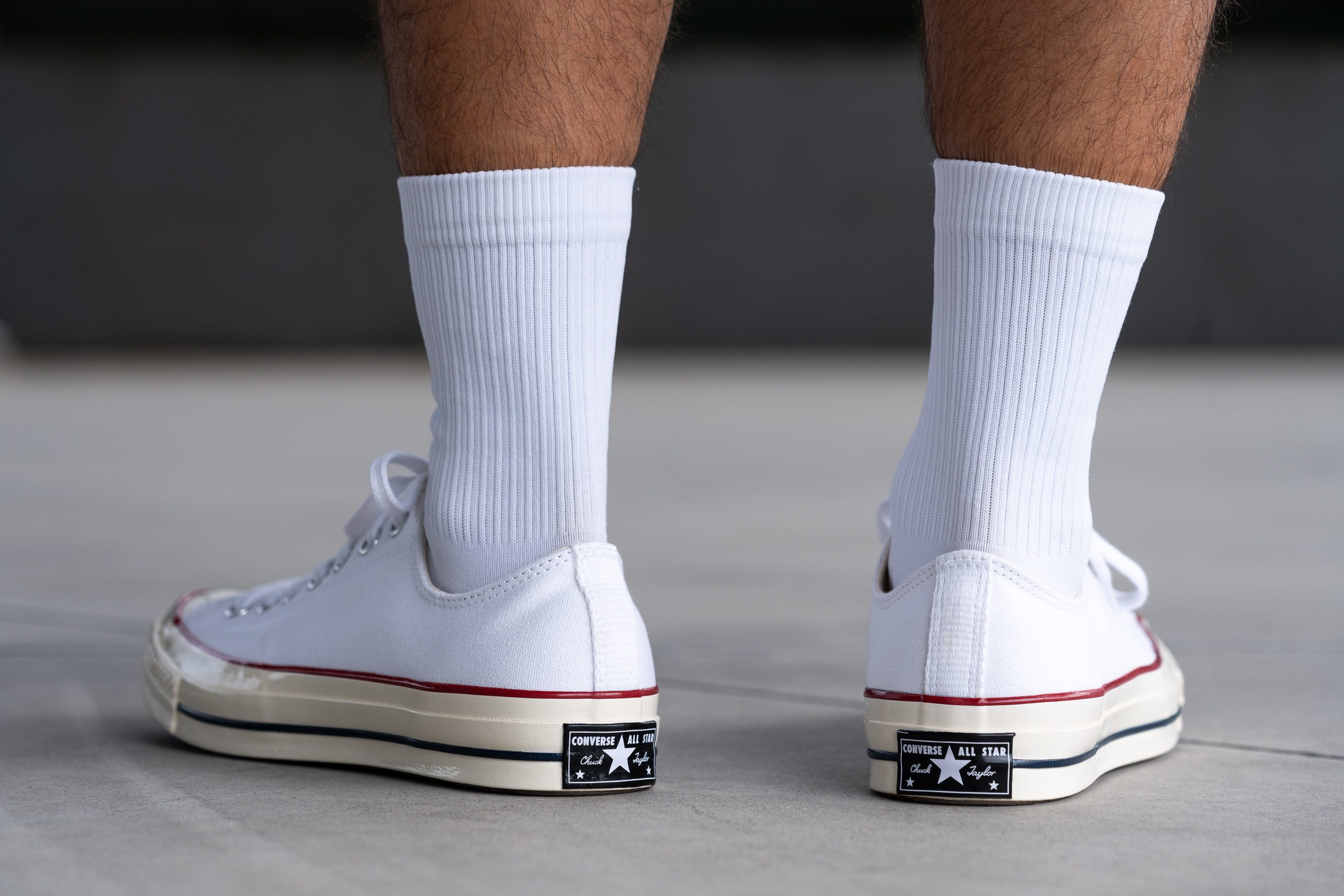
One of the Chuck's main draws is its simplicity, which appeals to all ages, cultures, subcultures, and social groups.
Historical reference
The Chuck Taylor sneaker has a long and rich history that spans over an entire century! It was originally designed as a basketball shoe in response to the fast-growing popularity of the new sport.
In 1922, the kick received a few upgrades courtesy of a Converse employee named Charles (Chuck) Taylor. A semi-basketball player and coach at the time, he found a way to make the shoe more supportive and flexible.
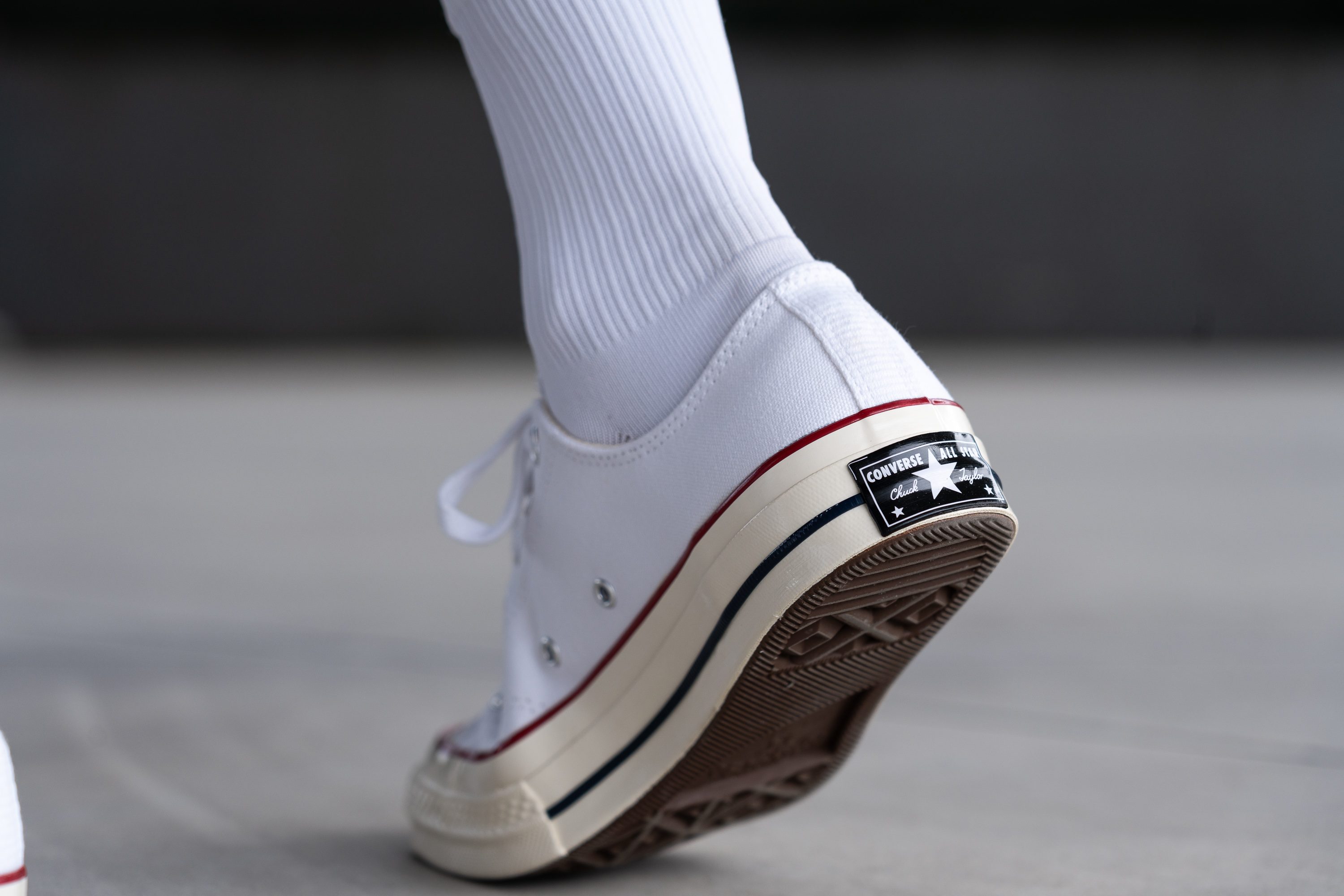
By the '60s, the shoe caught fire on the market taking up 70-80% of the basketball footwear niche. And by 1971, the All-Star shoe was already touted as "America's No.1 basketball shoe."
After losing popularity as a performance shoe, Converse reintroduced the Chuck Taylor as a retro casual sneaker. Since then, it has become an icon that can be seen anywhere from a grocery store to the red carpet.
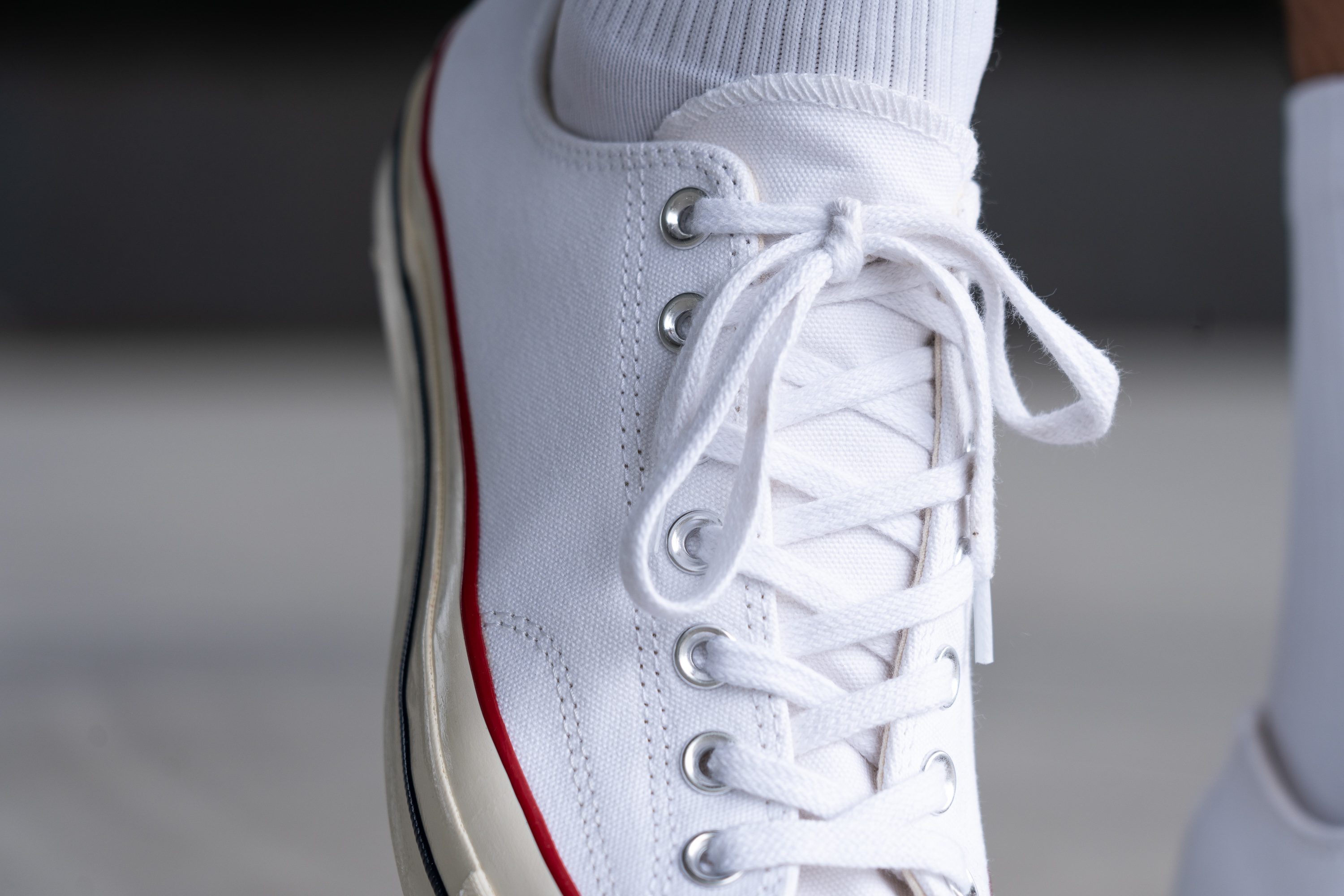
Chuck 70 Low vs. Chuck Taylor All Star Low
The Converse Chuck 70 Low Top was released in 2013, along with its High Top counterpart.
Both shoes look nearly identical to the original Chuck Taylor All-Star but introduce a few important updates to elevate its quality and comfort.
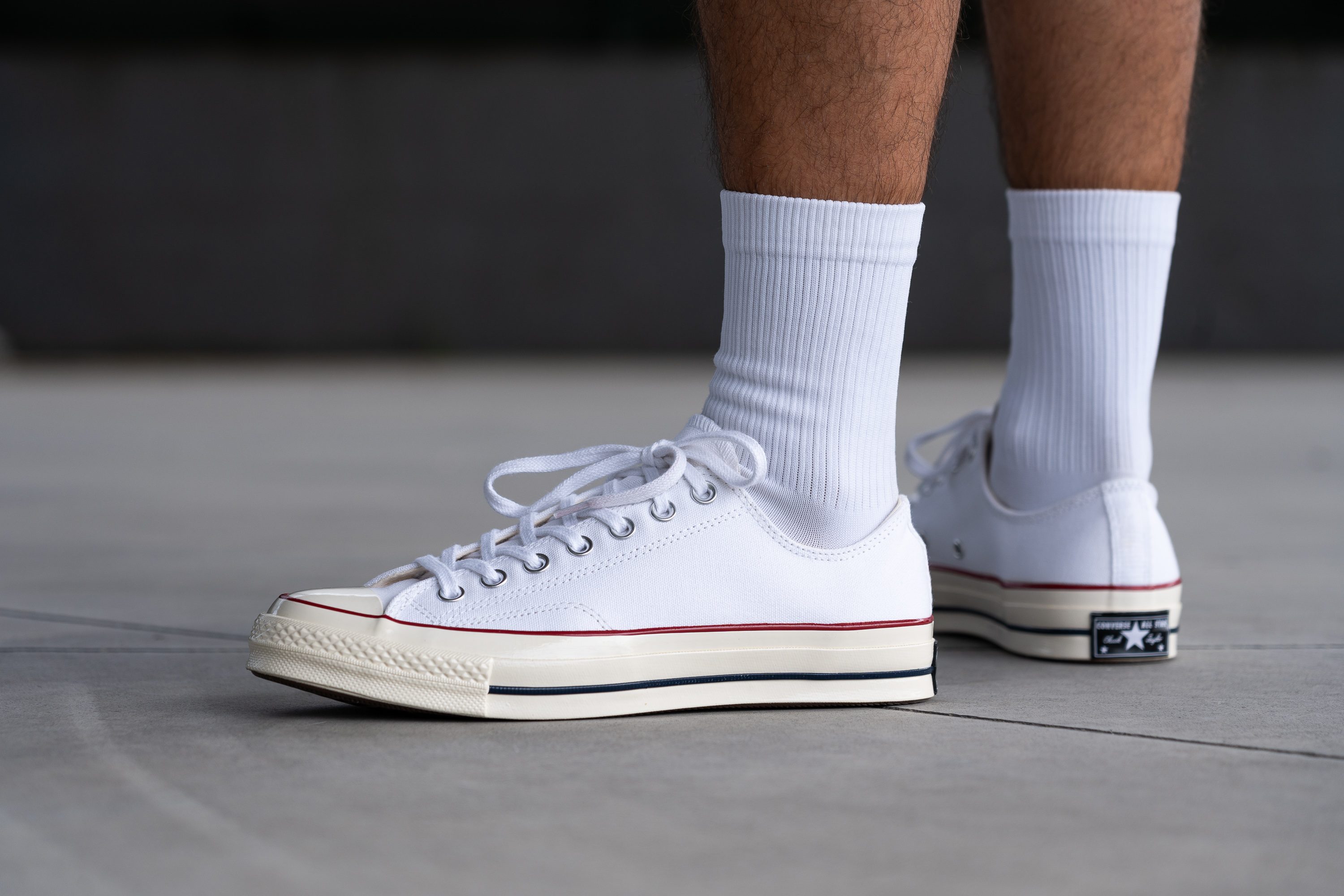
For $25 more, the Chuck 70 Low Top features the following improvements:
- thicker canvas upper of better quality
- taller rubber sidewalls and thicker taping
- much thicker and cozier OrthoLite insole
- smaller toe cap for better flexibility and in-shoe feel
- extra material behind the toe cap for reinforcement
- stitched-on circular logo instead of the printed one
- an updated black heel patch in place of the old white one
- glossy sole over the matte one
